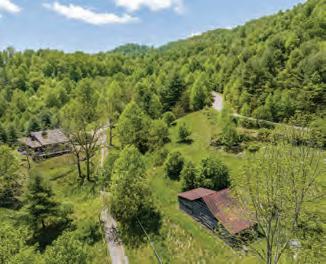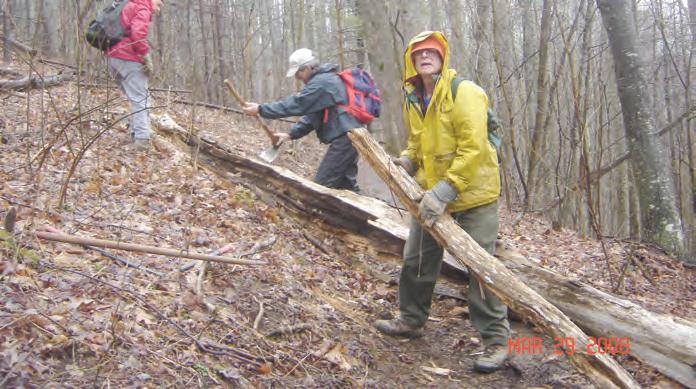Pactiv Evergreen sounds final whistle





The North Carolina General Assembly declared 2023 the “Year of The Trail,” in hopes of getting more people to appreciate the state’s outdoor gems. But will it get beyond a marketing effort to a real investment in building and maintaining routes? (Page 28) A mountain biker takes a break on the Heartbreak Ridge Trail near Old Fort in McDowell County. Great State Trails Coalition photo
News
As local leaders look to heal, Canton mourns its mill ..............................................4 Senate budget proposes large changes for WNC courts......................................6
Former paper mill employees observe last whistle blow..........................................7 Macon County budgets for revenue neutral tax rate................................................8 Macon will address cryptocurrency mining..................................................................9
Following mistrial, settlement reached in Knibbs case..........................................10 Senior prank leads to legal ramifications....................................................................11
Debate continues on Cherokee constitution vote..................................................12
No tax increase likely for Jackson..................................................................................14
Pless makes progress with collaborative rehab proposal....................................15
Loss of paper mill is a loss for forests ........................................................................18
A few words about your accommodations ..............................................................19
A&E
Renewing the fire through education: A conversation with Lori Reed..............20
A look into the future from 40 years ago....................................................................27
Outdoors
Park Service releases updated “Green Parks Plan”..............................................31 Parkway services open for the season........................................................................33
D ESIGN & PRODUCTION: Jessica Murray.
Snyder.
D IGITAL MARKETING S PECIALIST Stefanee Sherman.
ADVERTISING SALES: Susanna Shetley.
Amanda Bradley.
Sophia Burleigh.
C LASSIFIEDS: Scott Collier. .
N EWS E DITOR: Kyle Perrotti.
WRITING: Holly Kays.
Hannah McLeod.
Cory Vaillancourt.
Garret K. Woodward.
jessica.m@smokymountainnews.com
stefanee@mtnsouthmedia.com
susanna.b@smokymountainnews.com
jc-ads@smokymountainnews.com

sophia.b@smokymountainnews.com
classads@smokymountainnews.com
kyle.p@smokymountainnews.com
holly@smokymountainnews.com
hannah@smokymountainnews.com
cory@smokymountainnews.com
garret@smokymountainnews.com
ACCOUNTING & O FFICE MANAGER: Amanda Singletary. . . . . . . . . . . . . . . . . . . . . . . smnbooks@smokymountainnews.com

D ISTRIBUTION: Scott Collier. . . . . . . . . . . . . . . . . . . . . . . . . . . classads@smokymountainnews.com
C ONTRIBUTING: Jeff Minick (writing), Chris Cox (writing), Don Hendershot (writing), Thomas Crowe (writing)

WAYNESVILLE | 144 Montgomery, Waynesville, NC 28786

P: 828.452.4251 | F: 828.452.3585
SYLVA | 629 West Main Street, Sylva, NC 28779
P: 828.631.4829 | F: 828.631.0789


Catering is Our Passion!
We Can Cater Everything from an Intimate Get-Together to a Large, Formal Gathering & Everything In-Between!


294 N. Haywood Street Waynesville





















Hours
 BY C ORY VAILLANCOURT P OLITICS E DITOR
BY C ORY VAILLANCOURT P OLITICS E DITOR
Nearly three months ago, Pactiv
Evergreen unceremoniously announced that after more than a century in operation, the paper mill at the heart of Canton would close. Since then, Canton Mayor Zeb Smathers has repeated an analogy comparing the community’s reaction to that of a death in the family.
First it was shock, and the cold comfort of denial. Then, raging red anger, followed by indistinct grey hues of bargaining, finally giving way to the darkness of depression.
All along, Smathers insisted, what the community really needed to move forward with acceptance, and with hope, was the finality of a funeral.
Canton got its funeral on May 24, when the final blow of the mill’s whistle pierced the warm spring air at noon sharp. Over the course of five minutes, the whistle gathered enough steam to reaffirm its once-mighty authority — the power to call workers to the massive 185-acre complex, or to send them to lunch, or to send them home.
“Maybe it was just my imagination,” said Gail Mull, a mill retiree, union secretary and mayor pro tem of Canton. “But today, it didn't sound as robust as it has in the past.”
At least they still had the steam, Mull said, and someone to blow it.
Workers, retirees and members of the
public had gathered outside the mill, on rooftops, in parks or on bridges. Some cried. Some clapped and cheered. Others just stood silent, taking in the whistle’s last testament to a community that since 1908 had grown up around it.
Mull, now in her mid-seventies, said she’d heard that whistle blow nearly every day of her life.
After five minutes of silence, the town’s faith community joined in with a tribute of its own — church bells chimed a hundred fifteen times, for each year the mill had been open.
Now, local leaders continue to look for a way forward as a community mourns, but tying up the final affairs of the dearly departed will be a complicated, prolonged and messy ordeal.
In Canton’s Sorrells Street Park, dozens of television cameras chased hundreds of people who’d gathered to share the sound of the whistle with each other, one last time — their life stories often inseparable from that of the paper mill itself.
Through its many seasons, the mill had been known by several names — Evergreen, Blue Ridge Paper and Champion. One can tell with a great amount of certainty during which era a person worked in the mill by what they call it today.
“If there had not been Champion, there would not have been me,” said Mike Green, a fourth-generation mill employee who’s now retired.
Green’s great-grandfather came down from West Virginia to work at Sunburst, one of the many regional logging operations that kept the mill going. Another great-grandfather left Biltmore to work in the mill. Green’s grandparents owned land at what is now Sunburst Trout Farms. His father was born at Lake Logan, Champion’s exclusive executive retreat located deep in the Haywood County wilderness, 9 miles up the Pigeon River.
Green was 4 months old when he made his first visit to the mill, cradled in the arms of his grandfather. When Green was 8 years old, the number 19 paper machine came online.
“Growing up, I went to a library built by Champion. I swam in a [YMCA] built by Champion,” he said. “That's gone. That culture and history has gone.”
After graduating from college, Green became a salesman for Champion.
“I sold milk cartons made from the paper on that machine I first saw when I was 8,” said Green, now 66. “That machine, yesterday was its last day.”
Asked about the whistle, Green became emotional like others in the park, many of whom had their phones out to record the historic moment.
“I wanted to cry, actually,” he said.
That final blow may have been heartwrenching for some, but the greatest sorrows will likely come the first few times that whistle doesn’t sound.
“I think people that are not here don’t really understand that visceral connection to it,” Green said. “It's a comforting sound. I live about 2 miles away. Seven o'clock in the morning, you hear the mill whistle. Sometimes, in summertime, you got a win-
dow open and you could hear the machines making the rumbling sounds. You could hear the train going back and forth. And now it's going to be silent.”
Change, Green said, isn’t necessarily something that he enjoys, but it is constant — whether good or bad.
“Once there's no smell and no smoke, and I think Asheville is going to come this way,” he said. “You already know that. I expect property values to go up. It depends on what they do with the site.”
What happens to the 185-acre parcel will ultimately determine how, and how quickly, Canton and Haywood County rebound from the closing of the mill. The entire site is flood-prone, and mill facilities have been damaged by the Pigeon River’s raging wrath at least twice in the last 19 years.
For decades, the mill has treated the Town of Canton’s wastewater.
Various environmental issues still likely loom at the site, although the mill’s periodic air and water quality violations may now be a thing of the past.
Gov. Roy Cooper has demonstrated success in drawing major employers to North Carolina, which has been recognized as one of the best states in which to do business.
Most recently, Apple and Toyota have joined what CNBC called “the nation’s strongest economy,” but aside from a Pratt & Whitney facility in Asheville, none of those economic development wins have manifested in the rural west, where goodpaying blue-collar jobs like those at the mill are scant.
“We would hope that some type of business would come there,” Cooper told a gaggle of reporters in a Canton bookstore on May 26. “I know there's a real hope that something will come immediately. Realistically, that's probably not going to happen immediately, but we were talking today to the local economic developers here, our state Department of Commerce, our Economic Development Partnership. We're all working with this area to bring good paying jobs here.”
Cooper responded quickly to the March 6 closing announcement, despite getting no formal notice from Pactiv Evergreen. Along with Attorney General Josh Stein, Cooper thinks that by terminating its workers, Pactiv has violated the terms of a $12 million economic development grant authorized by his predecessor, Pat McCrory.
“They’ve broken that contract,” Cooper said. “And so the state believes that they owe the money back.”
The lack of notice — not even Smathers was given a heads-up about the closing — may have contributed to a health care coverage crisis at the mill, where workers are now scrambling to ensure they don’t end up uninsured come Aug. 1.
Pactiv also wants a tax break for the parcel and on June 2 will argue to the Haywood County Board of Equalization and Review that the $19.7 million parcel is actually worth $5.8 million.
“It's like knocking you down and then stepping on you before you leave,” Cooper said. “It is shameful to be making that kind of request right
now.”

If that reassessment is granted, Pactiv, a global corporation with net revenues of more than $6 billion in 2022, would save around $70,000 in tax payments to the county and another $70,000 in tax payments to the town of Canton. That’s the equivalent of a person with an annual income of $150,000 trying to save $3.25 on a cup of coffee.



When he learned of the reappraisal request, Smathers said he was disgusted.


“We cannot fill the budget holes left by the closing of this company overnight. It will take years if not longer. Sacrifices will have to be made,” he said. “I tell people that in some regards, the tough times have yet to happen.”



The March 6 closing announcement came as Canton was in the middle of its annual budgeting process. Town Manager Nick Scheuer put the brakes on an ambitious budget in anticipation of an immediate revenue hit — the town sells massive amounts of water to Pactiv, and at least some of the mill’s $100 million annual payroll comes back to the town in the form of sales tax collections — but the real budgetary impact won’t be felt until next year.
Sen. Kevin Corbin (R-Franklin) told The Smoky Mountain News that he’s asking the general Assembly for $40 million in a comprehensive assistance package that will help displaced workers, municipal governments and schools.


Rep. Mark Pless (R-Haywood) has multiple initiatives in the works, including trying to find the money for a new wastewater treatment plant before Pactiv’s two-year agreement to continue operating the existing plant ends.
“As sad as we are now about losing the mill,” Smathers said, “trying to maintain a level of services and sophistication without at least $3 million in our budget is going to be extremely challenging.”
Canton’s annual general fund budget is on the order of about $11 million. Scheuer said there was no way he could work around a $3 million hole.
Bipartisan cooperation — Cooper, Smathers and Stein are Democrats, while the majority of county officials and state legislators are Republicans — has thus far been a hallmark of relief efforts, just as it was when flooding killed six and caused tens of millions in damages to town facilities in August 2021.

“This is not a partisan situation,” said Corbin, appearing in Canton with Cooper last week. “This is not a situation where politics has anything to do with it. This is about helping people.”
This is also not simply a Canton crisis.
Given the regional nature of Western North Carolina’s economy, the fiscal implications associated with the closing of Pactiv Evergreen’s Canton mill will create what Smathers has called “a Carolina crisis,” reverberating across space and time into the homes and businesses of people across the southeast who mistakenly believe that they are somehow insulated from the consequences of the mill’s demise.
“No man is an island, entire to itself. Each is a piece of the continent, a part of the main,” wrote 17th-century English poet John Donne, in explaining the interconnectedness of all things. “Therefore, send not to know for whom the bell tolls. It tolls for thee.”
Western North Carolina’s judicial system might get the help it’s needed for several years now.
In the recently proposed North Carolina Senate budget bill, there is a line item that would not only split the 30th judicial district — which includes Haywood, Jackson, Macon, Swain, Clay, Graham and Cherokee counties — it would also establish a public defender office in each of the new judicial districts. The split would place Haywood and Jackson in district 43B and the other five counties in 43A, a move that would mirror how the superior court districts are already split. The change from 30 to 43 would ensure the judicial districts match the current 43rd prosecutorial district, which would still include all seven counties.
The call for both the district split and public defender offices isn’t new — there has been talk of at least splitting the district for decades now. However, in the wake of the coronavirus pandemic and the backlog of cases court shutdowns created, those calls intensified. Rep. Mike Clampitt (R-Swain) introduced a bill in April 2021 that would have split the district. That bill died in committee.
A Smoky Mountain News story from last year called further attention to the issue. Several attorneys quoted in that piece said that both splitting the district and establishing a public defender office were necessary to avoid a constitutional crisis.
In early 2021, a meeting attended by judges, legislators and District Attorney Ashley Hornsby Welch was held. While neither the judges nor Welch would discuss what was talked about, the legislators provided some details. In the story from last year, two legislators discussed generally what was said.
“[The judges] expressed to us the fact that they’re overworked,” Sen. Kevin Corbin (RMacon) said.
“I got the impression that judges all wanted the district split,” Rep. Karl Gillespie (RMacon) said.

In a December 2021 letter from the Committee on Indigent Appointments for the Superior Court Judicial District 30B — made up of Superior Court Judge Bradley B. Letts, Chief District Court Judge Roy Wijewickrama and other stakeholders — to Indigent Defense Services Executive Director Mary Pollard, the group noted that things were getting worse. At the time that letter was written, there were no attorneys on the courtappointed list for high-level felonies in Haywood. Attorneys on that list are typically the only way to ensure adequate representation for indigent defendants who can’t afford an attorney.
On March 7 of last year, Letts wrote a letter to Pollard formally requesting a public defender office. In that letter, Letts references a February bar meeting, writing that a consensus was reached among attorneys present calling for a public defender office.
“Our local bar has made numerous efforts and, without exception, valiantly done all

which could be reasonably asked of them to assist … Haywood and Jackson counties continue to lack sufficient attorneys on the courtappointed lists and in turn regularly encounter barriers in maintaining a timely and efficient system for providing sufficient and effective legal representation and related services to indigent defendants,” the letter reads.
“When considering the past issues which have arisen, the present need for courtappointed counsel, and the overwhelmingly positive support expressed by those in District 30B for a public defender office, I believe the request is well-reasoned and warranted by the reality which now exists in the courtrooms of Haywood and Jackson counties,” the letter continues.
In an interview with SMN on May 30, Wijewickrama said the courts aren’t currently able to meet the demands they’re faced with due to the rising number of case filings that have come with a steadily growing population.
“I also believe there’s just not as many attorneys moving to Western North Carolina, so there’s not enough of a pool of attorneys to be on the court appointed list,” he said.
Wijewickrama noted that a public defender office would benefit the “entire court system.” Along with providing indigent defendants with adequate representation right away, it would increase the system’s overall efficiency. Right now, it’s up to a judge hearing a case to find an attorney to represent an indigent defendant if no one on the court appointed list is available. Sometimes that means calling around to different counties. That can be a time-consuming process.
“The judge has to stop court and find lawyers, but the public defender office would handle all that,” he said.
Haywood County Clerk of Superior Court Hunter Plemmons said having a public defender office will alleviate his office’s workload since his criminal court clerks are currently tasked with assigning criminal cases to attorneys on the court-appointed list, and they wouldn’t have to do that anymore. Beyond that, he believes it’s necessary to alleviate the burden in Western North Carolina. Some cases are continued because the defense attorney has work in another county that prevents them from getting to a hearing. Plemmons said that wouldn’t happen as much.
“I think that a public defender office is extremely needed in Haywood and Jackson considering the shortages of attorneys, and I see how overworked the ones we have are. It would provide better access to justice for the defendants,” he said.
In the SMN story from last year, Pollard discussed the process to appoint a public defender. First, the bar convenes and nominates two or three individuals. Next, the Administrative Office of the Courts comes up

with a nomination. Finally, once they receive those nominations, the Senior Resident Superior Court Judges, Judge William Coward in the newly proposed 43A and Judge Letts in 43B, would appoint someone.
Public defenders have a dedicated staff that can roughly mirror the district attorney’s, although the appointed chief public defender gets control over staffing and the office’s budget. Pollard said sometimes, for any number of reasons, the staff could be bigger or smaller than that of a district attorney’s office.
Based on Pollard’s interview from last year, those concerned with the state of the judicial system in the region may have cause for hope. At that time, she said that the “heaviest lift” is simply getting the General Assembly interested in using resources to open a public defender office. Now that it’s a budget line item — which makes it more likely to pass than as a standalone bill — there may be cause for optimism. If the budget passes with those items, once the offices open, results should be immediately noticeable “Some relief will come relatively quickly,” Pollard said.
Corbin said he worked with Sen. Ralph Hise (R-Mitchell) and Sen. Danny Britt (R-Robeson) to get the items into the budget after speaking with Judge Coward and multiple clerks of court.

“The problem has been we have this huge caseload and right now you’re dependent on lawyers working in that capacity as individual lawyers. There just aren’t enough to take the cases and the DA can’t proceed with the case until they have representation,” Corbin said.
The proposed split would place four judges in Haywood and Jackson counties and three in the other five — a net increase of one judge for the whole region. While District Attorney Ashley Welch declined to comment for this story, Corbin said that in his conversations with her, he learned that about 65% of the caseload in the current judicial district is in Jackson and Haywood.
Five of the six judges in the current judicial district live in Haywood County, while just one, Judge Tessa Sellers, resides in what would become 43A. This means one of the five Haywood judges would have to leave the bench and two more would be appointed or elected from out west.

While it may seem tricky to determine who from Haywood would step down, the decision has essentially already been made. On May 30, Judge Kristina Earwood announced she was retiring due to health reasons, effective June 1.
In her letter to Gov. Roy Cooper and the bar announcing her retirement, Earwood
wrote that the decision wasn’t easy to arrive at. “I have always loved my job and I worked very hard to get it,” the letter reads. “Campaigning with their mom at every potluck in seven counties will forever be engrained in my kids’ mind. Nevertheless, I know from doing this job for nearly 13 years, that it requires one’s full attention, focus and dedication. I can’t offer that right now.”
State law dictates that the local bar — which is made up of all licensed attorneys in the seven-county district — will vote to put forward five recommendations to fill the open seat. Those recommendations go to Cooper, who appoints the new judge; he is not necessarily bound by any law to select one of the names provided by the bar. While it may seem likely that Cooper, a Democrat, would appoint someone from his own party, that hasn’t always been the case. In 2018, he appointed Peter Knight, a Henderson County Republican, to a district court seat. Because the judicial district may split, it would make sense that Cooper would appoint someone from one of the five westernmost counties who could then serve in the newly established district 43A. Although the bill doesn’t specifically address the additional new judge, it’s likely that they would be selected by voters in the 2024 election. North Carolina Supreme Court Chief Justice Paul Newby would select one of the judges in 43A to serve as the Chief District Court judge, which is an administrative role.
Western North Carolina’s state representatives are somewhat split on those budget items. Clampitt, who sponsored last year’s bill that aimed to split the district, said he was happy to see the items included in the Senate bill, and Corbin, who lobbied for their addition this go-round, expressed full commitment to seeing their inclusion in the final budget. Gillespie declined to weigh in on whether he’d support splitting the budget items. Rep. Mark Pless (R-Haywood) said he doesn’t support the addition of the public defender office or splitting the district.
“It’s a resource and a money thing,” Pless said. “When I was a [Haywood County] commissioner, I always said I wouldn’t do unfunded mandates, and now we’re dumping two public defenders, 16 assistant public defenders and 10 staff members into the judicial district. No one called the counties to see if they can handle it.”
The disagreements between the House and Senate when it comes to the budget have been heavily reported by news outlets around Raleigh. While some items may be end up stricken from the final budget, casualties of compromise, Corbin said he believes the items splitting the judicial district and establishing the public defender offices will make it into the final budget.
It’s 11:57 a.m. Wednesday in downtown Canton. Daniel Gregg is standing on the Park Street bridge overlooking the Pigeon River. Leaning against the bridge, Gregg kept gazing up at the tall smoke stacks of the Pactiv Evergreen paper mill.

“I really hate to see things the way they are,” Gregg said through solemn eyes. “I enjoyed what I learned [in that mill] and the people I worked with. It could’ve been better — it didn’t have to be this way.”
Next to Gregg is his family. Wife. Daughter. Grandkids. Three minutes later, they all looked toward the stacks and stood in silence while the mill blew its final noonday whistle — an ominous sound signaling the end of production at the mill, ultimately bookending a 115-year chapter of the small town’s existence.
“I still hope and pray something would continue. And it still might, but I doubt it,” Gregg said. “What I’m looking at right now is the preservation of the heritage here, all of the mill history and the people who dedicated their lives to working there — it gives me chills knowing I’ll never hear that whistle again.”
At 67, Gregg worked at the paper mill for 47 years. He was just 20 when he first stepped foot in the mill as a wet-behindthe-ears employee. He’s also a proud fourth-generation mill employee, with his great-grandfather on his mother’s side bringing some of the first wood to the mill when it opened in 1908.
When asked about the future of not only Canton and its
former mill employees, but also that of uncertain times and choppy waters to navigate in this current American economic landscape, Gregg is steadfast in his response.
“There’s hardly a middle-class anymore. We’re just fading away. I’ve worked hard all my life to have what little I do,” Gregg said. “Middle-class people need to continue doing what we’ve done for so long — stand up and be Americans helping one another to sustain our jobs. I can’t see an ultrarich and ultra-poor society — we cannot tolerate that.”
With a slight sigh, Gregg takes one last look at the mill in all its glory of production, progress and prosperity. His entire adult life has been spent within the walls of a soon-tobe-dormant factory.
“Not being able to hand [the jobs and work] to the next generation — that’s the saddest part,” Gregg said. “Probably the best people in the industry worldwide have been right here, the generations before me and including mine. I’ve given 100% every time I went in — this shouldn’t be the end.”
Within earshot of the Park Street bridge is BearWaters Brewing Riverside. Even though it was midday and midweek, dozens of patrons packed the taproom and outdoor patio area on the banks of the Pigeon to hear the whistle one last time.
In solidarity, the brewery crowd held up small glasses of the “Papertown Pilsner” to salute the moment — “to the next chapter” being the mantra of choice. Across the river, hundreds of figures huddled in Sorrells Park, with countless others filling the downtown sidewalks.
At exactly noon, the mill whistle echoed for five minutes throughout the town and into the ancient mountains cradling the community. While the Canton and greater Western North Carolina soaked in the somber spectacle, freight trains and tractor-trailers filled with product from the
mill were still chugging along the tracks and through the streets.
Thereafter, church bells were faintly heard the distance, ringing once for every year the mill was open. Soon, the multitudes dispersed, the town again quiet and empty. Back at BearWaters, young folks and old-timers traded tall tales and honest truths of the mill — a storied past, a dismal present, an unknown future.
“I made a lot of friends there. You don’t realize it until you get in there, but it’s a brotherhood,” said Matthew Stephenson, sitting on the BearWaters patio.
Stephenson had worked at the mill for the last five years. At 50 years old, the mill has always been in background of Canton native’s life. He remembers sitting in the classroom as a teenager and hearing the mill whistle sound off at lunchtime.
“When I graduated from [Pisgah] High School, I always thought I’d like to work there. But, it was a hard ticket to get — you had to know somebody to get in,” Stephenson noted. “And when I finally got the opportunity to work there, I wish I’d had come straight here out of high school — it was a great job.”
For Stephenson — and for innumerable area families going back over a century — the mill closure is truly an end of an era. Though only employed at the mill for half a decade, Stephenson said he planned to make a career out of his position, and to eventually retire from the mill at some point down the line. Now? He recently took on a gig at UPM Raflatac in Mills River.
“You think about the men and women that worked there, and how they took care of each other inside [of the mill],” Stephenson said. “And they also take care of each other outside here, too — we take of each other in this town, and that won’t change.”
‘It didn’t have to be this way’
Macon County has experienced incredible growth over the past several years, both in population and property values. Despite this increase in the tax base, county administration is recommending a revenue neutral tax rate that would leave Macon residents with the lowest property tax rate in the state, but with a public school system in need of more funding.

“It’s conservative budgeting meets sustained revenue,” said County Manager Derek Roland. “It is an example of why we have continued to improve our financial position and continue to meet the demands that this organization has been pressed with in response to increasing population and increasing demand.”
The recommended budget for Macon County for the upcoming Fiscal Year 202324 totals just over $64.5 million, for an increase of 9.3% over the previous year. It does not pull any money from fund balance and maintains $42 million, or approximately 68% of expenditures, in the fund balance.
“The fund balance continues to provide us with a high degree of financial security. It leaves us well-insulated from economic uncertainty,” said Roland. “We do have a nice fund balance and that is the product of years of conservative leadership, fiscal responsibility and continued fiscal responsibility with this board.”
According to Roland, for counties with expenditures of less than $100 million, the average fund balance is around 39%.
The budget is balanced with what will likely be the lowest tax rate in the state — $0.27 cents per $100 of assessed property value. While this is a significant drop from the tax rate of $0.40 per $100 of assessed value just last year, because the recommended tax rate is revenue neutral, most residents will not see a drop in the amount they pay in property taxes.
Ad valorem property tax collections are the primary revenue source in the general fund budget accounting for about 53% of funds. The Fiscal Year 2023-24 budget currently under consideration by county commissioners is the first budget produced following the reappraisal of real property in Macon County. The revaluation is required of the county every eight years by the state of North Carolina and this year resulted in an increase to the Macon County tax base of 51%, from approximately $8.5 billion to about $12.8 billion.
“A revaluation in any year is a heavy lift, and it is an especially heavy lift when you’re talking about a 51% increase in property values,” said Roland. “Following that, you had 2,100 appeals that have come through this
tax office. Approximately $1.4 billion in value was appealed and of that appealed amount, $300 million of it was overturned through adjustments after sitting down and going through this with property owners. That’s a tremendous job by the tax office and a great job by Abby [Braswell, tax administrator] and her staff.”
In the budget cycle directly following a revaluation, North Carolina General Statute requires the budget to list the revenue neutral tax rate — the tax rate at which the county would generate the same property tax revenue as the year before, prior to the revalua-
“That natural growth would have happened regardless of the revaluation,” said Roland. “It happened between ‘22 and ‘23, that growth at $200 million was resulting in us under-projecting the tax base for ‘23. There was simply more growth that occurred than we projected and that $200 million is going to account for that $870,195 increase in this revenue category.”
Sales tax is another primary revenue source which accounts for about 22% of the overall budget, or about $14.1 million in the coming fiscal year. That’s representative of a $1.9 million increase over last year.
“While that falls short of the school system’s $1.5 million requested increase in operational funding, it will be vital to the school system in the coming fiscal year,” said Roland. “It’s going to allow them to address inflation in the cost of goods, personnel and services.”
During the 2023-24 Fiscal Year, average daily membership of Macon County Schools is expected to increase to 4,433 students. According to data available from the Department of Public Instruction, Macon County ranked 51st out of 116 school districts in per pupil appropriation for current expenses in Fiscal Year 2022-23 at $2,031 per pupil. That amount will increase to $2,187 per pupil if the recommended 2023-24 budget is adopted.
The school system currently has a long list of pressing capital needs, including the possibility of a new Franklin High School. Earlier this year, the county commission asked the school board to prioritize the list of capital needs and committed to funding the top five priorities. This left a project that would renovate Highlands School off the list. Since the decision was made, Highlands residents have been imploring the county commission to fund the project.
The recommended budget includes an increase of $177,375 for education capital outlay for a total of $2.1 million. This includes the annual Macon County Schools capital outlay amount of $1.15 million, plus $873,658 for the replacement of the Highlands soccer field and $115,000 for improvements at HCC.
According to the county manager, between 2021 and 2022, Macon County saw a 1.3% increase in population, exceeding the regional growth for the same period which is estimated at 0.2%.
tion, with the new total assessed valuation — however, counties are not required to implement the revenue neutral rate. Macon County administration has proposed a 2023-24 budget that is balanced at the revenue neutral tax rate of $0.27 cents per $100 of assessed value. If the county commission approves the budget as recommended, Macon County will likely have the lowest tax rate in the state of North Carolina.
“If your property value went up around the average, you’re either going to see a tax decrease, or you might see a slight tax increase,” said Roland. “But regardless, if you stayed in that 48-51% increase range with your property, then your tax impact is going to be minimal to negligible.”
Despite the choice to recommend a revenue neutral tax rate, the county will see more than $1.5 million in additional tax revenue coming into the 2023-24 budget. Just over $100,000 of this is attributed to a 0.37% increase in the tax collection rate thanks in part to upgraded tax collection software. Another $500,000 is attributed to the revaluation growth factor of 1.62% and over $800,000 of it is attributed to the $200 million growth in the tax base during the 20222023 Fiscal Year.
The budget accounts for two new positions in the sheriff’s office — one deputy and one narcotics investigator. This will increase patrol to six per shift and will result in fulltime law enforcement coverage in Highlands and Nantahala areas.
“Demand in the sheriff’s department remains steady, averaging approximately 13,500 calls annually and demand continues to increase,” said Roland.
Both positions are funded by reductions to operating expenses in the sheriff’s budget, primarily a reduction in budgeting for overtime.
For the first time in four years the recommended budget proposes increasing the county’s allotment for public education. The education expenditure will increase by just under $1 million for a total of $10.1 million. Most of the additional funds, $880,638, will go to the Macon County School system and the remaining $72,482 of additional funds will go to Southwestern Community College to cover cost increases associated with general supplies, maintenance and utilities. The increase in funding to MCS falls short of the school system’s funding request.
“This population growth, which began during the pandemic, has been accompanied by economic growth. Particularly in the real estate industry, construction industry and in the travel and tourism industry,” said Roland.
In 2021, during the height of the COVID19 Pandemic, visitor spending in the county totaled $390 million for the year. In 2018, visitor spending totaled $178 million. That represents an 82% increase in visitor spending from 2018 through 2021.
“Undoubtedly, this has been a primary contributor and still is contributing to increased sales tax growth in Macon County,” said Roland. “From 2021 to 2023 the average actual sales tax revenue that we have received has been 15.3% above prior year actuals. For the years 2015 through 2020, just to give you some idea, the average actual sales tax growth for those five years was 5%. So you’re looking at tremendous growth in sales tax revenue there, driven by that travel and tourism industry.”
While real estate sales in Macon County have declined by about 30% through 2023 to date, average sale prices in the Franklin area have remained largely unchanged at around $290,000. In Highlands, real estate prices year to date through May
Macon County is the latest in Western North Carolina to address the rise in cryptocurrency and its disruptive mining practices with a change to its high-impact ordinance.
At its January meeting, the county commission requested that the planning board look into the high-impact ordinance and how it may be used to regulate crypto mining facilities.

Planning Board Chairman Glen Hedden came back before the board May 9 to recommend certain changes to the highimpact ordinance and to request a public hearing be set to review and consider the changes.
The proposed changes would add “cryptocurrency mining facilities and/or similar server based facilities” to the list of high-impact land uses. Other highimpact uses involve airfields or airstrips, asphalt plants, chip mills, commercial incinerators, concrete suppliers and other developments that can be disruptive to surrounding properties.
The ordinance proposes cryptocurrency mining facilities be defined as “the operation of specialized computer equipment for the primary purpose of mining one or more blockchain based cryptocurrencies such as Bitcoin.”
Regulations on high-impact land uses previously required these entities to be separated by specific distances from schools, child care homes, child care institutions, day care centers, hospitals and nursing homes. The planning

have exceeded last year’s by over 30% with an average sales price of over $1 million.


Construction and development have continued to increase into 2023. During 2022 the county issued 720 building permits that had a total estimated value of 200 million and added 235 buildings onto the tax rolls. In 2018 the county issued 430 building permits with a total estimated value of $70 million.
“This economic growth we’re experiencing here locally is directly reflected in increases to our primary revenue sources in this budget. This growth, while it has created economic development, has also presented challenges. Inflation, although it’s down, is up 5% through March of this year, which is down from 8.5% through March of the prior year,” said Roland. “It simply costs more to do business because of that and while it is reduced, it still persists.”
After the county manager presented the proposed budget to commissioners at their May 23 meeting, commissioners agreed to
board has proposed adding residential properties to that list, so that high-impact developments have to be a certain distance from residential units.
In addition to separation, setbacks, noise, light and other safety requirements, the planning board has proposed adding a signage requirement for high-impact developments. This would require high-impact land use operations to clearly display a sign that states the name of the operator and a local phone number for the operator in case of emergency. The board has also proposed prohibiting use of cargo containers, railroad cars, semi-truck trailers and other similar storage containers for any component of the operation within a cryptocurrency mining facility.
The ordinance would require these cryptocurrency mining facilities to have a separation distance of 1,500 feet, stream setback of 150 feet, principal use setback of 750 feet and a buffer width of 100 feet.
In the Smoky Mountains News’ four-county coverage area, Haywood County is taking a similar route to Macon County, using its high-impact development ordinance to address cryptocurrency mining. In addition, The Swain County Board of Commissioners has discussed concerns regarding cryptocurrency mining.
The discussion and public hearing on the changes to the high-impact land use ordinance will take place during the Tuesday, June 13, meeting of the Macon County Commissioners.
take time to digest the information before coming back for a work session to discuss the budget.
Commissioner John Shearl said he would like to see a list of all the needed repairs to all county buildings and properties during the next meeting.
“We need to, in my opinion, get a list of these things and start taking care of these buildings and properties that the taxpayers of this county have built and paid for. They are in desperate need of maintenance,” said Shearl. “That’s where our taxpayers' money will be best spent is taking care of this stuff that they’ve bought, built and paid for and not ignore this stuff.”
Shearl said that while the budget was proposed with a low tax rate, some Macon County buildings are “falling apart,” a statement that the county manager said was “not true.”
Commissioners were set to hold their first budget work session at 12 p.m. Tuesday, May 30, and hear from school administration, the Sheriff’s Department and Macon County Emergency Management.

and easy access to lake amenities such as outside pool, kayaking, paddle -Seller, W

nal, caring, great communication. Our property

After five years of litigation the Macon County Sheriff’s Office and former Macon Deputy Anthony Momphard have agreed to settle the wrongful death lawsuit filed by the Estate of Michael “Scott” Knibbs for $900,000.
The case had been previously tried in federal court but ended in a mistrial due to a hung jury.
Knibbs was killed by Macon County Deputy Anthony Momphard on April 30, 2018, just after midnight. Momphard fired six shots through Knibbs’ front porch window. Two of the bullets struck Knibbs inside the living room of his home. He took a few steps and died on his dining room floor.
Momphard had been dispatched on a non-emergency basis to the neighborhood after a complaint was made by a neighbor about boards placed across a shared gravel driveway. The neighbors were having a party next door to the Knibbs residence. An hour before he was killed, Knibbs had an encounter with a young man who mistakenly pulled into his driveway looking for the party, which led Knibbs to put the boards out.

Momphard arrived shortly before midnight and parked his car when he encountered a board across the driveway. The porch light and interior lights were all off inside
the Knibbs home except for a nightlight. After speaking with the neighbor, Momphard went to Knibbs’ home with his flashlight holstered.
Momphard announced “sheriff’s office.”
When Knibbs heard the announcement, he told his wife that “anyone can say they are sheriff’s office.” He picked up a shotgun he kept next to his bed, racked it to chamber a shell and went toward the front door to investigate the voices and protect his family.
Momphard heard the shotgun being racked inside the home and then shouted at least two times toward the darkened home to “put it down.” During the trial earlier this year, Momphard said when he heard the shotgun rack, he was afraid he was going to be shot through the closed front door. Momphard went onto the porch toward Knibbs’ front door — a move that was questioned during the trial. He shined his flashlight through a window next to the door.
When he saw Knibbs holding a shotgun, Momphard began shooting. Perhaps the greatest question during the trial was whether Knibbs was pointing the shotgun at Momphard. Both the plaintiff and defense presented expert witnesses to bolster their claim.
Knibbs’ widow, Missy Knibbs, retained Mark Melrose and Adam Melrose of Melrose Law, and Josh Nielsen of Nielsen Law to represent the family. After prosecutors declined
to bring up criminal charges, they filed a federal lawsuit on April 16, 2019, for violation of Knibbs’ Fourth Amendment constitutional right to be free from excessive use of deadly police force and claims under North Carolina State law for wrongful death.
The case was originally dismissed on Nov. 5, 2020, by Judge Max Cogburn, who held that Momphard was entitled to qualified immunity. The Knibbs family appealed, and the Fourth Circuit Court of Appeals reversed Cogburn’s decision and ordered a jury trial. The sheriff’s office appealed that decision to the United States Supreme Court, but the Court refused to hear the appeal.
The case went to trial on Feb. 5 of this year. The jury was unable to reach a verdict. The case was scheduled for retrial on June 5. The settlement was reached as the parties prepared for the retrial.
According to a press release sent out by attorneys for the plaintiff, the Knibbs family is relieved that the defendants agreed to settle this case, so the family did not have to relive that horrific night again during a second trial. Several family members were present throughout the trial, and there were several moments that proved emotional.
“Scott was a hardworking family man who ran his own tree service business and was very active in his local church,” the release reads. “He had two children with
Missy and also raised another child with Missy. He was an active outdoorsman who loved to spend time with his family hunting and fishing. He enjoyed riding motorcycles and simply being outside with friends and family. He was a supporter of law enforcement and had graduated from Basic Law Enforcement Training years earlier when he considered law enforcement as a career. He participated on the security committee with his church.”
Mark Melrose made his own statement in that release.
“This case has been one of the most challenging, hard-fought cases of my career,” he said. “Proving a case of excessive police force is often impossible due to the defense of qualified immunity. The Plaintiff has to present overwhelming evidence that the law enforcement officer violated a clearly established constitutional right. That was even more challenging in this case because the only two eyewitnesses to the shooting were Scott and Deputy Momphard. We then had to rely upon forensic evidence and witnesses who heard, but did not see, what happened. We were frustrated by the hung jury in February, and we were all set to present the case again in June when settlement discussions were successful. The Knibbs family has persevered through exhausting litigation as well as gossip in the community about what happened.”
 BY HANNAH MCLEOD
STAFF W RITER
BY HANNAH MCLEOD
STAFF W RITER

A group of Smoky Mountain High School seniors could be facing criminal charges for what administrators see as taking a senior prank a step too far.
“The actual prank was fine, but what occurred afterwards was not,” said Jackson County Schools Superintendent Dana Ayers.
According to Ayers, a group of senior students at Smoky Mountain participated in a senior prank on the evening of May 16 that was supervised and condoned by school administration. However, the students later returned and did more pranking without permission.



“The Smoky Mountain High School senior prank began as a harmless have-a-littlefun prank and went according to plan,” said Ayers during a school board meeting May 23. “It is the actions after leaving the building that are irresponsible and illegal. Students were directed to leave campus, but they returned and reentered the building without permission and trespassed on campus.”
Sylva Attorney Jay Pavey, who is representing at least some of the students involved in the event, described the nature of the prank that was committed after students reentered school campus later that evening.
“Their egregious act is that they toilet papered one of the hallways, or some of the hallways, I believe, and they took some chairs out of a classroom and zip tied them, and that was the extent,” said Pavey. “Nothing was damaged, nothing was broken, no one was hurt.”
Jackson County Schools did not confirm the extent of the after-hours prank but did say that the prank took valuable time from administration in the midst of wrapping up the school year.
“Much time that should have been spent focusing on instruction, school safety and preparing for testing and graduation ceremonies was spent by the Smoky Mountain High School administrative team and the



SRO on investigations,” said Ayers. “I am disappointed by these actions and disheartened by the community uproar that surrounds the incident. The students’ actions have resulted in law enforcement pressing charges with my support.”
Students who participated in the prank may be facing criminal ramifications, but they will still be able to walk for graduation.

“Additional consequences could have included exclusion from graduation exercises; however, as has already been communicated to students and families, I do not believe families should be excluded from graduation,” said Ayers. “Students involved will be permitted to participate in graduation ceremonies.”


Pavey contends that there is confusion surrounding the events of May 16, specifically whether the students ever actually left campus after the first supervised and condoned portion of the prank was completed.
“I would say to you that some of what you’ve heard is not the entire truth,” said Pavey during the May 23 school board meeting. “I think there’s some question about what has taken place. Yes, there was a school prank; yes, the children did go out there and they did conduct part of the prank, and I think there was some question about whether they actually left the school in its entirety or not, but the fact of the matter is, some of the students did stick around.”
The result of these acts is possible criminal charges for the students.
“Criminal charges — I want you to think about that,” said Pavey. “We’re going to saddle these students with criminal charges because they took a prank a little too far.”
Pavey suggested that instead of criminal charges, the school system mandate community service or volunteer time at the school for the students involved. For the JCPS administration, the incident is a learning opportunity.
“My hope is that a lesson has been learned by the students from this incident,” said Ayers.




During its next meeting Thursday, June 1, the Cherokee Tribal Council is set to debate the future of a referendum vote that could give the tribe its first constitution in more than 150 years.
In its April 6 meeting, the body unanimously approved a resolution placing the proposed constitution — developed with community input over the course of six years by a dedicated group of tribal members — on the ballot in the Sept. 7 General Election. But afterward, Attorney General Michael McConnell attended an April 20 meeting of the Constitution Committee to say that as currently written, the document would have some “very troublesome” unintended consequences. McConnell recommended withdrawing the referendum resolution and instead addressing issues with the tribe’s current governmental structure through piecemeal amendments to the Charter and Governing Document, which currently stands as the tribe’s supreme law.
The Cherokee Community Club Council — the group that submitted the constitution referendum resolution — publicly rejected that suggestion in a May 12 commentary published in The Cherokee One Feather. However, that’s the solution that Tribal Council is slated to consider June 1.
The resolution on the June agenda, which was submitted by McConnell’s office, would rescind the constitution referendum approved April 6 as well as a separate referendum resolution, approved in March 2022, that sought to amend the Charter and Governing Document to institute staggered terms and term limits for Tribal Council. In its place, the resolution would approve a referendum vote on four amendments to the Charter.
The referendum questions proposed by McConnell’s office would ask voters to
The proposed constitution isn’t the only referendum question scheduled for discussion in Tribal Council June 1. The body will also consider resolutions seeking to legalize cannabis use for adults 21 and older and to allow mixed drinks to be served at “qualified establishments” on tribal land.
The cannabis resolution, submitted by Big Cove Rep. Teresa McCoy, refers to Tribal Council decisions in 2021 that decriminalized possession of small
change the Charter’s name to “Constitution of the Eastern Band of Cherokee Indians” and to add three new sections to the document. The first, Section 25, would enshrine the Judicial Branch as “a separate and co-equal brand of government,” its power vested in the Cherokee Supreme Court “and in such inferior courts as Tribal Council may from time to time ordain and establish.”
The second new section would state that “all provisions of the Indian Civil Rights Act shall apply in all judicial proceedings,” while the third deals with term limits for Tribal Council, chief and vice chief. These provisions nod to those contained in the proposed constitution and 2022 referendum resolution. Under the language proposed by McConnell’s office, these officials would be limited to no more than four consecutive two-year terms, excluding time served if filling an unfinished term through special election or appointment to the office. However, the amendment would not institute the staggered terms for Tribal Council members discussed in both the 2022 referendum resolution and the proposed constitution. All 12 Tribal Council members would continue to stand for election simultaneously, albeit once every four years instead of every two.
This “more measured approach” reflects “due caution and respect for the tribe’s existing legal framework,” the resolution says. While the proposed constitution “contains several positive concepts that could strength-
amounts of cannabis and established a system for allowing medicinal use of the drug.
In 22 states, the District of Columbia, Guam, Canada and numerous U.S. tribes, adults over the age of 21 are allowed to purchase and consume cannabis products, the resolution states. Providing access without the burdens imposed by the medical cannabis framework “will allow for qualifying adults to have personal control over their own health sovereignty,” and expanded cannabis sales “is a critical part of economic development and a means to provide revenue to the tribe,” it says.
The proposed referendum question would ask voters whether they support legalizing possession and use by people 21

en tribal sovereignty and governance if properly expressed and executed in relation to existing law,” immediately repealing the Charter and replacing it with the Constitution “will void or conflict with multiple existing tribal laws and, because it shifts governmental functions and powers, some of its provisions cannot be implemented without a plan for its succession as the supreme law of the tribe,” the resolution says.
In its commentary to The One Feather, the Cherokee Community Club Council said that the constitution group has welcomed input from “outside perspectives” and “subject matter experts” during its years of work on the document, questioning why McConnell waited until after the April 6 vote to specify his concerns. After all, the commentary points out, the resolution was on Council’s published agenda for at least a week prior to the session.
The commentary responds to McConnell’s concerns point by point and stresses that the Constitution is meant to be a legal framework for tribal government, not an exhaustive treatment of each possible scenario. Areas not addressed by the Constitution would be filled in by the Cherokee Code, as has been the case under the Charter.
“All of the Cherokee Code would remain in effect as long as it does not contradict the Constitution,” the commentary states. “As an example, the Constitution does not express
and older and requiring Tribal Council to develop legislation regulating the market.
The resolution regarding mixed drinks was submitted by three other Council members — Vice Chair Albert Rose, Birdtown Rep. Boyd Owle and Yellowhill Rep. T.W. Saunooke. It builds on a landmark referendum passage in 2021 during which voters approved a trio of measures related to alcohol, allowing retail beer sales, an ABC package store, and beer and wine sales at establishments like restaurants and hotels. The 2021 referendum followed decades of failed attempts to expand alcohol availability on the Qualla Boundary. Harrah’s Cherokee Casino was dry for its first 12 years of existence until a 2009 refer-
or explain how enrollment will work; it refers to the Cherokee Code. The Charter does not even mention enrollment.”

Should the constitution be adopted, some areas of existing tribal code would certainly come into conflict with this new supreme law, the commentary acknowledges, increasing the workload for McConnell’s office.
“We understand that passage of the Constitution will create challenges for the attorney general’s office,” the commentary says. “We have faith in the people and the attorney general’s office that we can work together to navigate this transition to unite the voice of all our people.”
It’s unclear how McConnell’s proposal will fare during Thursday’s meeting. Two months ago, the resolution submitted by the Community Club Council passed unanimously, with no discussion or pushback. But Snowbird/Cherokee County Rep. Adam Wachacha was absent from that vote, and some Tribal Council members might be second-guessing their previous decision. During the May 4 meeting, Painttown Rep. Dike Sneed said he planned to request that the constitution referendum come back to the floor in June in order to get “some issues with it” “worked out” ahead of the election.
Despite the resolution’s unanimous passage, Principal Chief Richard Sneed did not sign it, choosing instead to allow it to go into effect unsigned. In a May 17 debate, five of the six candidates for principal chief said that, while they support the effort to create a constitution for the tribe, they have reservations about certain aspects of the proposed document. Big Cove resident Lori Taylor was the only candidate expressing unequivocal support for the constitution as written.
Implementing the 24-page proposed constitution would represent a massive shift from the much shorter Charter that now governs one of the country’s wealthiest tribes, attempting to thread the needle on complex issues related to governmental structure, tribal sovereignty and civil rights. But the clock is ticking on efforts to amend the question facing voters Sept. 7 — the referendum question must be completed, approved and ratified by July 1 to make the ballot.
endum approved alcohol sales on casino grounds only. Referenda in 2012 and 2018 that sought to expand that availability failed to secure voters’ approval.
The proposed referendum question would allow the Tribal ABC Commission to issue permits for mixed beverage sales to the same establishments that are currently eligible to apply for beer and wine permits.
Tribal Council’s June 1 meeting is scheduled to begin at 8:30 a.m., but the two proposed referenda are toward the end of the timed agenda and expected to be discussed starting at 11:30 a.m. The meeting will be livestreamed at livestream.com/accounts/10717024 and on the EBCI Communications Facebook page.



The proposed 2023-24 Fiscal Year general fund budget for Jackson County totals just over $88.1 million, an increase of about 5.9% over the current fiscal year amended budget. It is balanced with a tax rate of $0.38 per $100 of value.
“There is no proposed tax increase,” said County Manager Don Adams.
Public safety and education each account for about a quarter of expenditures. General government takes up 16.5% of spending; human services 21.5%; and contingency, recreation, non-education debt, transportation and environmental protection together account for the remaining 12% of spending.
The proposed budget contains a onestep increase for all employees and a 3% cost of living adjustment for all employees totaling just over $1 million.
“We had several requests for salary reclassifications and new positions,” said Adams. “The classification and compensation study approved by the board March 15, 2022 and implemented effective January 1, 2022 should allow for the retention of existing personnel. The salary plan that has been implemented does allow for recruitment of both inexperienced and experienced personnel. I have not recommended any salary reclassifications in this proposal.”
New personnel, 15.5 positions, are recommended in the budget based on multiple needs. One housekeeper will be used for multiple facilities and one general utility worker is needed for the new Dillsboro Complex Facility. Four road patrol deputies and one detective for drug enforcement are recommended in the sheriff’s office. The jail is recommended to receive one new detention officer. A halftime administrative assistant is needed in code enforcement and a half-time programming manager is recommended for
the Green Energy Park. One animal shelter attendant is needed in animal control. Two social workers are needed to manage caseloads and to implement Safety Organized Practice, a new software system. A support specialist position in social services is proposed to be extended for one additional year.
“We believe this position will eventually also expand into Medicaid expansion,” said Adams. “What’s not listed here is any personnel needed for Medicaid expansion. Mr. Webster and I are going to be having some meetings with the state to start getting a better understanding of that. That is all dependent upon the state budget being passed. There will be some funding associated with it, but until we have a better understanding of what that is we can’t come back to you and present to you what the needs of social services will be.”
Three and a half positions are proposed for the new aquatics facility. They will be hired on a staggered schedule beginning Jan.1, 2024. The positions include a site manager, head lifeguard and one and a half administrative assistants.
There are capital needs in the budget totaling just over $2 million with $1.5 million proposed to be spent on computers, servers, printers and software, as well as equipment for garage, cleaning, grounds maintenance, recreation, law enforcement and emergency communication. About $550,000 will be spent on five new vehicles at the Sheriff’s Department and $60,000 for painting and decal updates.
“I’m recommending that you hire more people,” said Adams. “For those people, you need additional vehicles.”
Two code enforcement vehicles will cost $70,000, two grounds maintenance vehicles are recommended at $104,724; $37,300 is set aside for a Cooperative Extension vehicle and $30,000 for one social service replacement vehicle.
About $2.5 million is recommended for

capital improvements, including painting Cashiers code enforcement, replacement of one HVAC unit and painting in the Cashiers Recreation Center. Repairs are needed in the jail booking area, as well as cabinets and shelving in the kitchen, plus two HVAC units and a generator. Other improvements include Cullowhee Recreation Center building updates, Fairview Concession Road paving, repairs to the Sylva Pool, Mark Watson Park paving, Department of Aging roof repairs and road improvements plus an office unit at the Green Energy Park.
“Also included is a match for Highway 107 sidewalk construction,” said Adams.
Facility capital improvements will continue to the Aquatics Center, Domestic Violence Shelter, Whittier-Qualla Park and Glenville-Cashiers Splash Pad. All those projects have been previously approved by the board of commissioners and work has begun on the aquatics center and domestic violence shelter.
“The Qualla Park and the GlenvilleCashiers Splash Pad both have been designed to go out for bid and be done in the fall,” said Adams.
Jackson County is proposed to allocate $9,417,613 to the public schools for the coming fiscal year. This includes about $8 million for current operations, $880,950 in teacher supplements and $460,511 for counselors.
The county commits 40% of the Article 40 quarter-cent sales tax and 60% of the Article 42 half-cent sales tax to the public schools for capital. This will total $1.5 million or capital outlay for the school system.
“It is recommended to budget an additional $2.5 million for public school capital expenditures out of the Articles 40 and 42 sales tax. That’s not to be expended, that’s basically setting you up for your planning process,” said Adams.
There is $130,000 set aside in capital
outlay funds for the creation of a FY 20242028 Facility Capital Improvement Plan.
“These sales tax funds, future grants and available lottery proceeds will dictate the public schools’ FY 2024-2028 Facility Capital Improvement Plan,” said Adams.
The county will allocate $2.6 million for Southwestern Community College for current operations, a 4% increase in funding. The proposed general maintenance capital outlay appropriation is $154,850 for fire alarm system upgrades and $50,000 for incidental repairs.
The Jackson County Library is part of the Fontana Regional Library system. Therefore, the county will allocate $1.3 million to the FRL to operate both the Jackson County Library and the Albert Carlton Library. This represents a 4% increase in funding.
Other appropriations in the budget account for safety, community development centers and nonprofits.
It is proposed that Canada, Savannah, Balsam and Qualla Volunteer Fire Departments — the four departments remaining with volunteer service — and the Glenville-Cashiers and Jackson County Rescue Squads receive a 4% increase in allocation. Matching funds will be made available for equipment purchased under grant funding.
The Sylva Fire Department is being funded at $1.1 million. This will enable the department to have paid members on staff 24 hours per day, seven days a week by continuing to fund eight full-time positions. The department provides mutual aid to other departments within the county.

The Cullowhee Fire Department is being funded at $1.1 million. This department is also able to have paid personnel working around the clock and provide mutual aid throughout the county.
The budget proposes that Community Development Center funding to all 14 centers remain the same as Fiscal Year 20222023 levels, with the exception of the Community Table and Cullowhee revitalization which need to have funding increased to be brought back to preCOVID funding levels.

“If you take the Community Table, they were receiving $10,000, and I’m proposing to take them back to $20,000. The reason being is because when they received all the COVID dollars, they actually reduced their request to us,” said Adams. “Now those dollars are gone, they’re just asking to get back to level funding.”
The Solid Waste FY 2023-24 proposed operating budget is $5.2 million, which represents an increase of 1.69%% over the current year.
“This fund is completely funded from fees collected for the service. There are no major operational changes at this point. We are not proposing any increase in availability fees,” said Adams.
A public hearing for the proposed budget is scheduled for 5:55 p.m. on June 6 and the budget is tentatively scheduled to be approved by commissioners June 20, after the board has had the opportunity to make any final adjustments.
 BY C ORY VAILLANCOURT P OLITICS E DITOR
BY C ORY VAILLANCOURT P OLITICS E DITOR
Elected leaders from nearly all of Western North Carolina’s local governments continue to express strong support for Rep. Mark Pless’ efforts to bring a badly needed drug rehabilitation facility to the region. Now that Pless has found a health care partner willing to run the facility, he’s one step closer to making it a reality, although challenges remain.
“We understand the state well, and we understand the payers,” said Jonathan Wolf, CEO and founder of Pyramid Healthcare, during a May 25 meeting at the Robert C. Carpenter Community Building in Franklin.

Founded in 1999, Pyramid is an integrated behavioral healthcare system with more than 80 residential and outpatient facilities in the northeast and southeast. The company has had a presence in North Carolina for about a decade, including in Asheville, Brevard, Charlotte, Gastonia, Mars Hill and Stokes County.


Pyramid’s integrated system is a continuum that goes from detox to residential treatment to transitional housing to partial (outpatient) hospitalization to intensive outpatient services to fully-outpatient care. The full continuum lasts a year or more.
Last November, Pless spoke to a gathering of local elected officials and administrators at Holly Springs Baptist Church in Macon County, proposing that the seven western counties of Cherokee, Clay, Graham, Haywood, Jackson, Macon and Swain pool their national opioid settlement funds — more than $22 million, in total — to fund the operations of a facility in the western part of the state.
At that time, Transylvania County jumped on board. The group has since been joined by Madison County.
Pless represents Haywood and Madison counties, but throughout the process has enjoyed support from his Republican colleagues who represent the rest of the west — Macon County Sen. Kevin Corbin; Cherokee, Clay, Graham and Macon County Rep. Karl Gillespie; and Rep. Mike Clampitt, who represents Jackson, Swain and Transylvania counties.
Clampitt, a longtime fire captain in Charlotte, again spoke in favor of the idea while mentioning a half-brother who recently passed away after a lifetime of substance abuse problems.
Ultimately, the North Carolina General Assembly would be the entity to fund the facility, if Pless can get the money.
“Your representatives are going to try to help them build a facility when they tell us what size they want and how much money they want,” Pless said. “We’re going to try to do that. We kind of have a handshake [agreement] that when that time comes, we’re going to get help.”
Pyramid would first assist clients by navigating the health care coverage side of things, attempting to utilize the client’s private insurance for payment or qualifying them for Medicaid. If neither of those
options work, the counties would foot the bill from the settlement funds — essentially, drug company money.
“I don’t want the state of North Carolina paying for it, and I don’t want the counties paying for it, because it will bankrupt all of us,” Pless said.

Wolf told The Smoky Mountain News that the first two steps, detox and residential care, would cost about $8,000 per person, but the full six-stage program, once established, would total $10,000.
Macon County, Pless said, is probably the most central location for the facility, given the massive size of the coverage area — from Murphy to Madison County, and everywhere in between.
Making access to care even easier, Pyramid VP of marketing Dan Gellman said that almost 100% of their assessments or admissions are transported at no cost by Pyramid’s fleet of drivers, who currently make more than 40,000 trips annually, driving roughly 2.5 million miles.
Aware of NIMBYism that has plagued the drug treatment debate locally, Pless has garnered support from Macon County Commissioner John Shearl and Franklin Town Council Member Stacey Guffey, both of whom spoke strongly in favor of the Macon County location.
The specific location, however, is one of several challenges that will need to be worked out once the facility materializes. Developable land is rare in the west, and site prep costs are much higher than in flatter areas of the country.
Several people at the meeting expressed concern that the facility would eventually be overrun by justice-involved people who end up with judicial or DSS referrals.
“We’ve never been overrun by criminal justice,” Gellman said, adding that if they
were, they’d simply move people to another Pyramid facility.

Pless and fellow legislators have pushed for strong local control of the county funding streams, allowing individual counties to determine the extent to which they’ll partici-
pate. Gillespie, a former county commissioner like Corbin and Pless, supports the approach.
“All of us believe that the best decisions are made at the local level, not the state and federal level,” Gillespie said.
Yet to be determined is how the facility’s beds — maybe 100, maybe more — would be apportioned out to the counties. They could end up being reserved on a per capita basis, or perhaps assigned on a first come, first serve basis.
Staffing the facility may also be tough, with a general shortage of health care professionals recognized across the region and the state.
Pregnant clients represent safety and liability risks; however, Pyramid does treat them in other locations, and could in Western North Carolina as well.
There are also accessibility concerns regarding the elderly. Medicare does not fund detox or residential treatment; however, people who are dual-eligible for Medicare and Medicaid may qualify.
The final issue relates to the third step of the program, transitional housing. One of the biggest causes of relapse is the lack of safe, affordable, sober living environments.
The affordable housing crisis in the region is already well known, but Pless said the time for addressing the housing needs of people in recovery would come as the facility breaks ground.

Haywood County Animal Shelter is set to receive a $12,500 grant investment from national nonprofit Petco Love in support of their lifesaving work for animals in Haywood County.

Petco Love is a national nonprofit leading change for pets by harnessing the power of love to make communities and pet families closer, stronger and healthier. Since its founding in 1999, Petco Love has invested $350 million in adoption and other lifesaving efforts. And Petco Love helps find loving homes for pets in partnership with Petco and more than 4,000 organizations — like Haywood County Animal Shelter — across North America, with 6.7 million pets adopted and counting.
“Our investment in Haywood County Animal Shelter is part of more than $15M in investments recently announced by Petco Love to power local organizations across the country as part of our commitment to create a future in which no pet is unnecessarily euthanized,” said Susanne Kogut, president of Petco Love. “Our local investments are only part of our strategy to empower animal lovers to drive lifesaving change right alongside us. We recently launched Petco Love Lost, a national lost and found database that uses pet image technology to simplify the search for lost pets.”
“This investment by Petco Love to Haywood County Animal Services will help us to continue the mission to the community and their animals of providing high quality services and care,” stated Howard Martin, Director of Animal Services as he announced the grant.
The 2023 Travel and Leisure 500 list went live on April 21 with both Old Edwards Inn & Half-Mile Farm included. The news was announced online, and the full list appears in the May issue of the magazine.
Each year, the readers of Travel + Leisure vote for their favorite destinations, city hotels, resorts and more in the World’s Best Awards survey. Drawing on the 2022 World’s Best Awards survey results, Travel and Leisure recognizes the 500 best hotels around the globe in the 2023 edition. The Travel and Leisure 500 properties are divided into eight geographic regions, designed to serve as a trusted resource for millions of enthusiastic travelers.
The Franklin Chamber of Commerce Pop Up Market will be held from 10 a.m. to 3 p.m. on Saturday, June 10, at the Franklin Chamber of Commerce.
This Market will feature home based business-


The Franklin Chamber of Commerce cut the ribbon on a new nonprofit earlier this month. Together We Can is a 501(c)(3), nonprofit organization with the mission to educate, support and advocate for the Macon County fostering community, including the children and families; and to act as a critical support team for the Department of Social Services to help bring awareness to the needs faced by all.
Together We Can works to directly benefit foster children of all ages by providing specialized programs designed to address their needs from initial intake throughout their fostering journey. Together We Can is fundraising to create a safe and loving transition home. This home will temporarily comfort and show love to the children until foster family placement is found. The transition home will ensure that children being removed from traumatic situations and taken into the Departments custody will not have to sleep on an air mattress at DSS while awaiting placement.
Phase one is the purchase and renovation of a transition home. Phase two is building an educational building to teach life skills, tutor, teach foster and guardian ad litem classes and host support group meetings. Phase three and four are adding parking, fence in the yard and add a playground.
Julie Adams with Together We Can will be one of the speakers at the June Eggs & Issues Business Forum at 7:30 a.m. June 2 at the Franklin Chamber of Commerce. This forum will focus on the foster care system and how we as a community can help both the children and fostering families.
es in our area including Pampered Chef, Tupperware, Avon, Color Street Nails, Younique, NuSkin, Cleaning Service, Jewelry, arts and crafts and more.
“We are excited to offer a venue for these businesses to offer their products and services and to make the public aware of their presences in our area” said Linda Harbuck, Chamber Executive Director. “We have had a great response from vendors and look forward to seeing many of our residents come out and support them.”
The annual Lake Junaluska Flea Market will take place on Saturday, June 10, at the open-air Nanci Weldon Memorial Gym at Lake Junaluska from 8-11:30 a.m. Special early bird shopping is available from 7:30-8 a.m. for $5 cash.
“We look forward to once again welcoming friends and visitors to our family-friendly flea market to find useful items as well as unique treasures,” said Judy LaFountaine, co-chair of the flea market.
Areas of the flea market include furniture, plants, arts and crafts, ladies’ boutique clothing, luggage, electronics, kitchen items, linens, toys
and games, sports and camping, home décor, tools, holiday items, books and delicious, homebaked goods at the bake sale.
This year, the flea market will feature lots of bedroom furniture, particularly twin and bunk bed sets, desks, and table and chair sets. Look for an expanded “toys and games” area that will be under the large tent with “sports and camping.”
The flea market is hosted by The Junaluskans, a volunteer organization of Lake Junaluska Assembly made up of people who love the Lake, and the annual flea market is The Junaluskans’ largest fundraising event of the year. “We are grateful for the extraordinary community support for this event and look forward to sharing in fun and fellowship with all who come to shop,” said LaFountaine.
Proceeds from the flea market go toward many projects, including maintenance of Lake Junaluska gardens such as the Rose Walk, Corneille Bryan Native Garden, Biblical Garden and Inspiration Point; the Swan Feeding Program; the Community Chorus; Christmas decorations at the lake; Lake Junaluska cleanup programs; sponsorship of Clothes to Kids; and the monthly book review program.
For the comfort and safety of all shoppers, please note no dogs are allowed at the flea market except for official service animals.
Jim Casada and Tipper Pressley will present “Celebrating Southern Appalachian Food” for the June 1 meeting of the Swain County Genealogical and Historical Society in Bryson City.
Mountain culture has a rich culinary tradition that goes back for generations. Recipes passed down through generations of families and communities have provided glimpses into a culture that has long been defined by its food.
Casada and Pressley, authors of a recent book about the topic, will be focusing on the heart of enduring mountain food traditions. This will include coverage of staple foods, the nature of life where self-sustenance loomed large, traditional ways of preserving foods and favorite recipes/meals. Just as the narrative material of the book and scores of recipes offered share a deep love of place, it also reveals a devotion to the distinctive cuisine of our southern mountains.
The presentation will take place at 6:30 p.m. on June 1 at the Swain County Regional Business Education and Training Center 45 East Ridge Drive, Bryson City.
The closing of the paper mill in Canton is a major loss for its 1,100 employees and a shock to the area’s economy. The ripple effects also make it very bad news for sustainable forestry in the mountains.
For more than 100 years, timber harvests to supply forest products in Southern Appalachia have shaped and created the forests we see today. The pending closure of the paper mill in Canton will now shape the future of our forests. While historically some of the supply chain demands necessary to support these industries negatively impacted overall forest health, the paper mill’s use of only low-grade and small-diameter wood created opportunities for sustainable and beneficial forest management. When timber harvests are done using sound ecological principles, forest health can be maintained — or even enhanced through an increase in species and structural (tree age/size) diversity. The closure of the paper mill in Canton will severely reduce demand for pulpwood, which comes from small diameter (less than 12 inches) or poorly formed trees. Many of the restoration needs of our forests include reducing weedy, small trees that are often less desirable (economically and ecologically) and outcompete more desirable trees. The loss of demand for these lower value forest products will make it much less economically feasible for forestland owners to do improvement cuts to benefit wildlife, regenerate oaks, or to even sustainably harvest timber in WNC.
High costs were already leading loggers to cut only the larger and much more profitable sawtimber trees to make a short-term profit. This unsustainable “high-grading” has degraded forests for decades. Now, it will be almost impossible to sell the low-grade pulpwood, and even more high-grade
To the Editor:
What is the typical cost of a mass murder?
My bet is that it is very expensive. Maybe there is someone or a company that can show us the cost. Like you would arrive at the cost of a professional football game. Or a country music concert. We know that those events have costs and benefits. Mass murders have no benefits.
Mass murders have one cost that can’t be assessed easily. That is the loss to society of any hope of future contributions from victims. Actually, the same can be said of the shooter. Usually, they commit suicide or are killed by law enforcement personnel in order to prevent more murder.
As morbid as it may sound, I wish some accounting firm would pick one of the recent killings and analyze the costs for us. How many more can our society bear?
 Dave Waldrop Webster
Dave Waldrop Webster
sawtimber harvests will happen as a consequence. In these high-grade harvests, only the biggest and best trees (which are the best seed trees for future forests) are cut, leaving the smaller, poorly formed or unhealthy trees. The smaller pulpwood already had such low profit margins that many loggers would not cut it. High-grade harvests are usually implemented as a diameter-limit cut — i.e., cut all trees greater than 16 inches in diameter, which is when trees have significant sawtimber value — leaving behind a degraded forest with much lower quality, smaller (usually slower-growing) trees. Often a tree’s economic value as sawtimber/pulp mirrors its ecological value for wildlife, carbon storage, or simple beauty.
Forests struggle to recover on their own from these unsustainable high-grade harvests due to the removal of better adapted trees and their genetics. A sustainable timber harvest usually has to remove lower quality trees to let in enough sun so that a young stand of new trees can grow vigorously and compete in good conditions to develop into a healthy future forest. With no market for low quality trees, these less well adapted trees will now be left even more frequently and will become our future forests.
Rehabilitation forestry is already needed in many forests, usually where past high-grading has occurred, to improve their health, resilience, and diversity. Beneficial harvests remove lower quality, very common, less desirable trees to favor fitter trees and stronger forests. This can benefit plant
To the Editor:
A Floridian friend, who recently arrived in Maggie Valley, called me Sunday morning to alert me to a sight she found disturbing. The display of approximately 20 “lawn jockeys” outside Sutton and Sons’ antique store is in full view, right next to Dellwood Road.
The finishing touch on the display is a small black child eating a large piece of watermelon.
I hope this prompts all white people to have a John Lewis moment and “create good trouble!”
At the very least, please do not to patronize this establishment (money speaks) but consider calling or writing to them to express your outrage about this racist scene.
To all Christians, I’m going to ask, “What would Jesus do?”
Per Wikipedia, “Historically, black jock-
and animal species of conservation concern that need our help to compete in the absence of historic disturbances like fire and sustainable timber harvesting — or natural mortality and succession in true old-growth forests. In particular, habitat restoration for species in severe decline — like the goldenwinged warbler — that depend on young regenerating forests or forest openings, do not get the habitat they need from high-grade harvests or development.
The closing of this Forest Stewardship Council/Sustainable Forestry Initiative certified paper mill in Canton bodes very poorly for the future of sound and ecologically beneficial forestry in WNC. To make rehabilitation forestry projects economically feasible requires a market for low-quality pulpwood, so that loggers cut it to create diverse habitats and room for more desirable trees — like oaks, which need sun to regenerate and are the keystone species for wildlife. The losses from the mill closing extend from local to regional economic and social disruption to further degrading our forests and slowing needed restoration efforts.
EcoForesters will continue seeking solutions that incentivize restorative forest management by engaging with conservation partners, government agencies, and local communities. Western North Carolina benefits from sustainable and ecological forest management, but this will be a much taller order without the steady and significant demand for pulpwood supplied by the Canton paper mill.
(Andrew Tait is the co-Executive/Forestry Director for EcoForesters and is a state registered forester N.C. Registered Forester #1791. EcoForesters is a nonprofit professional forestry organization dedicated to conserving and restoring Appalachian forests through education and stewardship. He resides in Asheville.)

eys depicting racist caricatures of African Americans were commonplace. Several styles have been produced, with the most prolific being a shorter version commonly known as ‘Jocko’ and a taller version known as ‘cavalier spirit.’ The ‘cavalier spirit’ design
usually depicts the left arm raised and uses the likeness of a Caucasian young man, lacking the minstrelsy features of its Jocko counterpart.”
Jan Jacobson Waynesville


Dear family, we are so very pleased to have you with us this weekend to celebrate Jack’s graduation from high school. We welcome those who are staying on the residence as well as those who have gone to quite some expense to secure other lodging in the vicinity. We love you all!
I thought it prudent to go over just a few things that will hopefully make your weekend graduation experience more pleasant and memorable.




First, with respect to your accommodations, which we hope you will find comfortable and reassuringly tidy, please note the following. While one of your hosts has more of a laissez faire approach to housekeeping — his view is that a house that is TOO pristinely uncluttered is unnatural and may trigger guests into feeling some anxiety over “messing something up” — it may interest you to know that the other host has been obsessing over preparations for this event since mid-January and has been wrestling with an Excel sheet of tasks that simply must be done, right down to polishing the hinges on the closet doors (a kind word on these would be appreciated, but is certainly not required).
Somehow, like a horror movie monster, the list has continued to grow despite our best efforts to vanquish it. We complete and strike one task from the list and immediately think of two more to add. In any case, there comes a time to make peace with it, and we have, more or less. If you find a candy wrapper under a cushion, in the name of all that is holy, keep that intelligence to yourself. And sorry!
Speaking of candy, let’s talk snacks. You’ll find an array of them in the pantry and in the fridge. Sweet snacks, salty snacks, healthy snacks, decidedly unhealthy snacks — we’ve got them and you need to eat them or I swear we will tuck them into your luggage unbeknownst to you before you depart.
The same is true for the beverages. We loaded down the shopping cart with so many cases of soda, fruit juices, and waters that I felt I may need a special kind of operator’s license to maneuver the cart through the obstacle course of shoppers one commonly encounters at Sam’s Club, all oblivious to the very real danger posed by a shopping cart that weighs upwards of 700 pounds.
We should probably mention the ambience of our home, which some may find a little unusual. For one thing, it is haunted. As it happens, we live next to an old cemetery, and on occasion weird things will occur. For example, just the other night I was watching a baseball game, when all of a sudden, the sliding screen door that leads out to the deck began to close very slowly on its own until it was shut tight. This was no wind gust. It happened in slow motion, right before my eyes.
At other times, one of our three miniature dachshunds — I’ll get to them in a minute — will stand in a couple of different particular spots in the house and bark at nothing for five full minutes. Or at least it is nothing we can see, but we are pretty sure he is barking at spirits in the house, probably because they are not giving him any treats.
As far as we can tell, the ghosts who visit us from time to time are benevolent, although Tammy still insists on burning sage in various parts of the house to discourage them from coming around too often. But if one should close a door, open a window, or turn on a faucet for you during your stay, try not to make too much of it. It only encourages them.
If you find this unnerving, you can borrow our ghost-chasing dachshund for the evening, although he will wake you up at precisely 4:05 am to go outside to pee.
Let’s go ahead and discuss the dogs. We have four of them, three mini dachshunds and a chihuahua with an achy hip and a grumpy disposition unless he likes you, which he doesn’t. Not if you’re new, and especially not if you are a man. He is a rescue and evidently had some bad experiences with men, because he attempts to bite as many of them as he can.
The dogs will be outside for almost all of your stay, so no worries about the furry little meth-heads scurrying around your feet, yapping and lunging at your Ritz crackers and dip. If you see the chihuahua outside peering in, resist the urge to open the door to pet him. He’s not curious about you. He’s just wondering what your ankle tastes like.
Finally, as to the graduate. Well, he’s a little freaked out right now and a little overwhelmed to have people coming in from all over for the express purpose to see him graduate. If you have questions about his plans, well, he has those same questions, so please don’t expect any pat answers.
We’re so glad you’re here! Now, who’s ready for a Dr. Pepper and some Cool Ranch Doritos?
(Chris Cox is a writer and teacher who lives in Haywood County. jchriscox@live.com.)







We can learn about cultures, history, social and economic structures, and more importantly ourselves — especially where we have come from and where we are going as a society. Every person has a story to tell, every community a culture and history, and teachers play a primary part in guiding the younger generations in how to convey those stories through artistic means.
Last month, people could see a sign outside the Haywood County Arts Council gallery in Waunesville that read “Renewing the Fire through Education," which is the title of an art show curated by Cherokee High School teacher Lori Reed of the Wolftown Community on the Qualla Boundary.

Reed collaborated with her students and other faculty at the school to put together an exhibit that showcases students’ work, including pottery, weaving, finger weaving, beadwork, woodcarving, woodworking and 2-D art pieces representing the students themselves, their culture and their communities within the Qualla Boundary.
Recently, I was able to correspond with Reed to discuss the show, herself and her students, teaching and the mural that she and her students designed for the HCAC.

Breanna Delannoy: Tell me a little bit about yourself and your students?
Lori Reed: I am Cherokee, as well as most of my students. I have been teaching at the high school for seven years now. I teach arts/crafts and basketry. We work with traditional materials when possible. We have an awesome art department. We offer classes in cultural arts such as basketry, finger weaving, pottery and beadwork, along with woodcarving, woodworking and 2-D arts. The other teachers besides myself are Reba Elders, art teacher, Josh Adams, wood carving teacher and Matt Maney, woodworking teacher. The students are interested in carrying on family traditions. Most, if not all students come from families that do basket making, wood carving, beadwork, or other types of art. Most of them pick up the techniques pretty quickly and have a great interest in learning more.
BD: Along with teaching your students how to create the various art forms, how much focus do you place on teaching them the history of these methods, why they were used and how they’ve evolved or changed?
LR: I make it a point to teach the history of all the art forms that I teach. I want them to know where the materials came from that we would have used hundreds of years ago and how we have evolved to the methods and materials we use now. I tell them it is important to know this information so they know why we do what we do and how it helps to continue our culture as Cherokee people.
BD: Art has always been a positive form of expression. How do you feel that your students have taken their communities' history and
culture and used it to tell not only their own stories but the stories of their communities?
LR: The students are proud of their families and culture and enjoy being able to continue to do what their ancestors were doing years ago. It also helps them to continue the connection and sense of belonging to their Cherokee ancestors.
BD: As an educator and mentor, what do you see as the most important part of teaching art to younger generations, especially when it comes to teaching about the importance of connecting to the traditions and history of their communities?
cleansing us of bad medicine, ill feelings and a way to pray. The fire is an important element as well because it was at one time a very important aspect of our lives. We always kept a fire going in the home, which was used for cooking, for heat, for light and many other things. Once a year, that fire was doused and the hearth was cleaned out, also symbolic of the past year. We would go to the council house where the central fire was kept and never let it die out and get us an ember from this fire. We would take it back to our homes and begin our new fire for the new year to come, letting go of things from the past.
BD: What does "Renewing the Fire" mean to you?
LR: To me, "Renewing the Fire" means to continue to carry those stories, those traditions, those art forms and the language forward with us as we go into the future.
BD: As a teacher working in the community you’ve grown up in, how does it feel to empower and be a role model for the students that you get to work with knowing you are encouraging these younger generations to carry these traditions and knowledge into the future?
LR: I believe it is extremely important to give the students information about their culture and history so that they have a stronger sense of pride and understand that they can continue to keep our culture alive and strong through their own knowledge and skills.
BD: The mural that is going up on Wall Street [at the HCAC] is beautiful. Everything from the colors, characters from stories, syllabary, the door acknowledging the MMIW and basket design are such special and important facets of the EBCI. How did you and your students decide which stories to convey and what message you hoped the viewers would take with them?
LR: When designing the wall, I was asked to represent the Cherokee culture and our connection to sustainability of natural resources. Our culture relies on this knowledge and ability to continue to have access to these resources. It is an important part of keeping our culture alive. That is why the basket making materials are represented in the mural. I referenced stories of where we learned to make pottery and how to weave by including the mud dauber and the spider. The water design was found on our old pottery and represents our connection to water, not only because of its life-giving elements, but also because it is a big part of our spirituality. It offers a way for
LR: This is an important responsibility and I am always so grateful and proud when I have students that take an interest in what they are learning and continue to push themselves to get better. Over the years I have seen some phenomenal artists and hope they will continue to nurture the knowledge and skills they have gained from my classes. I know they get busy with college life or work life when they leave high school but I hope that in the future they will find their way back to the arts and continue to learn and to teach others.
Iawoke to the sounds of numerous police sirens. It was 6:30 a.m. Sunday. Looking out the eighth-floor window of the hotel onto downtown Indianapolis, Indiana, it was a police escort of numerous official looking vehicles en route to the nearby Indy 500. Within minutes, another police escort, then another.
Jumping into the shower, it was a mad rush to get dressed and head down to the parking garage to hop into the truck and make my way to the Indianapolis Motor Speedway. On assignment for Rolling Stone, I was now standing in the Midwest with press credentials to cover “The Greatest Spectacle in Racing.”
Pulling onto 16th Street, the traffic was at a standstill. Taillights and a hot sun slowly emerging from the early morning cloud cover. Sidewalks consumed with pedestrians heading to the track like ants to the anthill. Cruising long Auburn Street, every residential home was a front yard covered in parked cars. Driveway after driveway packed with jovial folks. Manic faces sipping on cold suds. Toss more hot dogs and burgers on the grill. Farmer tan shoulders and beer bellies adorned with t-shirts of whatever driver cheered on with a reckless abandon. Early 1990s country music blaring from car stereos, the sounds of John Anderson and George Strait echoing across the landscape like battle cries in the Heartland of America.
Putting the truck into park at Lot 2, it was a sea of humanity in seemingly every direction. Camping chairs. Beer coolers. Tailgates down. Crack open a Bud heavy and let the swirling energy of the moment envelope you. Surrender to the unknowns of “The Brickyard.” Inhale the smells of gasoline and burning rubber. Stick the ear plugs in when entering the track.
Approaching the Romanesque coliseum of auto racing, it was a scene of hysteria, tens of thousands milling about. Barely any security checks of beer coolers and backpacks. Too many faces to keep tabs on. Keep the line moving efficiently through Gate 6. Reach for another Bud heavy and pop it in gratitude for finally making it to the Indianapolis Motor Speedway. Head down the tunnel underneath the track and emerge onto the frenzied infield.
Over 300,000 souls wandering the massive property. The largest single-day spectator sporting event on the planet. The stands along the 2.5-mile track slowly filled to capacity. Beyond the grassy knoll on the infield of Turn 3 was a full-on EDM festival showcase, the likes of DJ juggernaut Kaskade and Subtronics bulldozing the tens of thousands of younger attendees finding themselves at “The Indy 500 Snake Pit.”
Standing on the grassy knoll, I did a 360degree scan of the insanity consuming any





within sight. The pyrotechnics of the Snake Pit stage exploded into the late morning blue sky. It wasn’t even noon, and yet most of the crowd was inebriated and exuberant. Fist pumps and swaying arms. Bass drops and head banging. Sunburns and cutoff jean shorts. Lukewarm domestic beer from backpacks and bottles of vodka snuck in through the lackadaisical security.
In an effort to see just how far the press credentials would take me, I found myself in front of the Pagoda Suites, a large glassenclosed multi-story building where the uber-rich, racing elite and celebrities congregate. At one point, I noticed famed actor Adam Driver ducking into the building. He’d later wave the green flag as the honorary starter of the Indy 500.
Thereafter, singer-songwriter Jewel appeared to sing the national anthem, many in the audience or standing in the long lines for chicken tenders and cheeseburgers finding themselves commenting “Is that Jewel?” and “Oh, I remember her” while watching the gigantic LED screens broadcasting the race.
1
There will be a special concert in memory of late Haywood County banjo great Steve Sutton kicking off at 5 p.m. Saturday, June 3, on the big outdoor stage at Silverados in Black Mountain.
2
Bluegrass/country sensation The Darren Nicholson Band will hit the stage for “Concerts on the Creek” at 7 p.m. Friday, June 2, at the gazebo in Bridge Park in downtown Sylva.
3
Craig Gralley will present his new book “Pisgah Astronomical Research Institute: An Untold History of Spacemen & Spies” at 3 p.m. Saturday, June 3, at City Lights Bookstore in Sylva.
4

A special stage production of “Big Fish” will be presented at 7:30 p.m. June 2-3, 8-10 and 2 p.m. June 4 and 11 at the Haywood Arts Regional Theatre in Waynesville.
5 Folkmoot Friendship Center (Waynesville) will host Mark Schatz & Bryan McDowell (Americana/ bluegrass) 2 p.m. Saturday, June 4.
The Indy 500 is the largest single-day spectator sports event.

Eventually, I landed on Pit Road. Arm’s length of pit crews, tire stacks, tool boxes and racing action in real time. Just past the concrete pit road barrier were 33 drivers and high-octane racing machines, speeds over 220 mph. You could barely distinguish the color of the cars, let alone which driver was positioned where.
The race itself is a mindboggling blur of whiplash laps, fiery crashes and subsequent cautions, pit stops to refuel and get new tires. Unless you’re way up in the stands to get a birds-eye-view of the madness, you’re either wandering around in search of another drink or you’re glued to the LED screens, with the majority of faces bouncing between the former and the latter.
In a finish for the ages, Josef Newgarden was victorious in his 12th attempt at claiming

his first Indy 500 win. With his helmet still on, Newgarden emerged from the racecar, ran over to the safety fence and squeezed through a small hole, only to disappear into the stands, soon swarmed by the jubilant crowd. Returning to Victory Lane, Newgarden sipped from the traditional glass bottle of milk, ultimately pouring the rest of the contents on top of his head.
Back under the tunnel to Gate 6 and Lot 2. Start the truck engine. Merge onto 16th Street and into normal society. Gazing into the rearview mirror, “The Brickyard” fading in the distance. Ears still ringing in the now silence of an otherwise mundane late Sunday afternoon in the Midwest. Wipe the sweat from your forehead. Crank the air-conditioning. A deep sigh of what was and what will be. Life is beautiful, grasp for it, y’all.
Acclaimed Americana/folk musicians
Mark Schatz & Bryan McDowell will perform at 2 p.m. Sunday, June 4, at the Folkmoot Friendship Center in Waynesville.
Schatz (of Nickel Creek, Bela Fleck and Claire Lynch Band fame) and multi-instrumentalist McDowell bring two generations and backgrounds together in an unparalleled synergy, humor, beauty and ease — taking the listener on a delightful, toe tapping journey through a landscape of fiddle and banjo tunes, songs, lilting waltzes and
searing guitar solos.
This multi-generational duo presents a broad spectrum of American acoustic music. Both Schatz and McDowell are multi-instrumentalists who cruise seamlessly from old-time to bluegrass, from folk to swing, playing and singing tunes and songs, old and new, including their own original compositions.
Tickets are $20 in advance, $25 day of show. Ages 12 and under free. For tickets, click on folkmoot.org.
Directed by Don Kirkindoll, the Haywood Choral Society will perform its spring concert at 5 p.m. Sunday June 4, at First United Methodist Church in Waynesville.
This season’s concert, “What Dreams May Come,” will explore dreams of the unknown future, of peace and freedom, of love, and hope of new life through the music of classical and modern composers including Ralph Vaughn Williams, Johannes Brahms, Eric Whitacre, Eriks Esenvalds, Elaine Hagenberg, Dan Forrest and more.
This is the first time the 60-member choral group will perform with Kirkindoll, who accepted the position of director in late February.
Kirkindoll has directed music programs/ministries and choirs of all ages in churches, schools, and community organizations for the last 25 years.
An experienced vocalist, Kirkindoll has performed in concerts from the White House to Europe and South Africa, as well as extensively throughout the southeastern United States. In August 2022, Kirkindoll became the Director of Music and Worship Arts for the First United Methodist Church of Waynesville.
Founded in 1997, with a goal to help preserve an appreciation for the great classical music of the past, as well as the present, the Haywood Choral Society is sponsored in part by The Junaluskans, the Haywood Arts Council and
• Balsam Falls Brewing (Sylva) will host an open mic from 8-10 p.m. every Thursday. Free and open to the public. 828.631.1987 or balsamfallsbrewing.com.
• Blue Ridge Beer Hub (Waynesville) will host a semi-regular acoustic jam with the Main Street NoTones from 7-9 p.m. every first and third Thursday of the month. Free and open to the public. For more information, go to blueridgebeerhub.com.
• Boojum Brewing (Waynesville) will host karaoke at 8:30 p.m. on Wednesdays, trivia at 7 p.m. on Thursdays and semi-regular live music on the weekends. All shows begin at 9 p.m. unless otherwise noted. 828.246.0350 or boojumbrewing.com.
• Cashiers Live (Cashiers) will host Caribbean Cowboys (oldies/rock) 6:30 p.m. June 9. Free and open to the public. villagegreencashiersnc.com/events/cashiers-live.
• Concerts On The Creek (Sylva) will host Darren Nicholson Band (country/bluegrass) June 2 and Andrew Thelston Band (rock/soul) June 9 at Bridge Park in Sylva. All shows begin at 7 p.m. Everyone is encouraged to bring a chair or blanket. These events are free, but donations are encouraged. 828.586.2155 or mountainlovers.com/concerts-on-the-creek.
• Cowee School Arts & Heritage Center (Franklin) will host Mountain Heart (bluegrass) 6 p.m. June 17. Tickets are $20 for adults, $10 for children. blueridgemusicnc.com/concerts.
• Farm At Old Edwards (Highlands) will host the “Orchard Sessions” w/Erick Baker (singer- songwriter) June 15. All shows begin at 6 p.m. Tickets start at $25 per person. For tickets, go to oldedwardshospitality.com/orchardsessions.
• Folkmoot Friendship Center (Waynesville) will host Mark Schatz & Bryan McDowell (Americana/bluegrass) 2 p.m. June 4. Tickets are $20 in advance, $25 day of show. Ages 12 and under free. For tickets, go to folkmoot.org.

• Fontana Village Resort Wildwood Grill will host semi-regular live music on the weekends. Free and open to the public. 800.849.2258 or fontanavillage.com.
• Friday Night Live (Highlands) will host Ezra & Katie (Americana) June 2 and Johnny Webb Band (country/rock) June 9 at Town Square on Main Street. All shows begin at 6 p.m. Free and open to the public. highlandschamber.org.
• Frog Level Brewing (Waynesville) will host its weekly “Tuesday Jazz Series” at 5:30 p.m., MollyFest 1-4 p.m. June 3 and semi-regular live music on the weekends. All shows begin
at 6 p.m. unless otherwise noted. Free and open to the public unless otherwise noted. 828.454.5664 or froglevelbrewing.com.
• Frog Quarters (Franklin) will host live music from 11 a.m. to 1 p.m. Saturdays. Free and open to the public. Located at 573 East Main St. littletennessee.org or 828.369.8488.
• Groovin’ on the Green (Cashiers) will host Caribbean Cowboys (beach/oldies) June 9. Shows begin at 6:30 p.m. Free and open to the public. Donations encouraged. villagegreencashiersnc.com/concerts.
• Happ’s Place (Glenville) will host The Remnants June 3, Doug Ramsey (singersongwriter) June 9 and Joe Owens (singersongwriter) June 10. All shows begin at 6 p.m. Free and open to the public. happsplace.com or 828.742.5700.
• Harrah’s Cherokee Casino Resort (Cherokee) will host Travis Tritt (country) 9 p.m. June 9. For a full schedule of events and/or to buy tickets, caesars.com/harrahs-cherokee.
• Highlander Mountain House (Highlands) will host a Sunday Bluegrass Residency noon to 2:30 p.m. and semi-regular live music on the weekends. For more information and/or to purchase tickets, go to highlandermountainhouse.com.
its Chorus Angels.
Admission is free. Donations are welcomed. For more information, visit haywoodchoralsociety.org.
The Pic’ & Play Mountain Dulcimer Players will be resuming in-person jam sessions at the St. John’s Episcopal Church basement fellowship hall in Sylva.
The group welcomes all beginners and experienced dulcimer players, including mountain (lap) dulcimer and hammered dulcimer players. Songs played include traditional mountain tunes, hymns and more modern music. The group meets at 1:30 p.m. on the second and fourth Saturday of every month in the basement of St. John’s.
Pic’ & Play has been playing together since 1995. The more experienced members welcome new players, help them navigate their instruments and guide them through some of the basics of tuning, strumming and playing.
The mountain dulcimer, also known as a fretted dulcimer or a lap dulcimer, is a uniquely American instrument. It evolved from the German scheitholz sometime in the early 1800s in Appalachia and was largely known only in this region until popularized more broadly in the 1950s.
For more information, call Kathy Jaqua at 828.349.3930 or Don Selzer at 828.293.0074.
• Innovation Brewing (Sylva) will host “Trivia Night with Kirk” from 7-9 p.m. every Monday, Open Mic Night every Wednesday and semiregular live music on the weekends. All shows begin at 7 p.m. unless otherwise noted. Free and open to the public. innovation-brewing.com.
• Innovation Station (Dillsboro) will host “Music Bingo” on Wednesdays and Tricia Ann Band (rock/country) June 3. All events begin at 7 p.m. unless otherwise noted. Free and open to the public. innovation-brewing.com.
• Lazy Hiker Brewing (Franklin) will host “Music Bingo” 6 p.m. Tuesdays, trivia 6:30 p.m. Wednesdays, Open Mic 6:30 p.m. Thursdays and semi-regular live music on the weekends. All shows begin at 7 p.m. unless otherwise noted. Free and open to the public. 828.349.2337 or lazyhikerbrewing.com.
• Lazy Hiker Brewing (Sylva) will host trivia 6:30 p.m. Wednesdays, Old Time Jam 6:30 p.m. Thursdays and semi-regular live music on the weekends. All shows begin at 8 p.m. unless otherwise noted. Free and open to the public. 828.349.2337 or lazyhikerbrewing.com.
• Meadowlark Motel (Maggie Valley) will host “Trivia Night with Jason Wyatt” June 1 and 8, Celtic Jam 7 p.m. June 2, Smoky Mountain Rain June 3, Heidi Holton (blues/folk) 7 p.m.
The Town of Sylva, Jackson County Parks and Recreation Department and Jackson County Chamber of Commerce are proud to present the 14th annual season of the “Concerts on the Creek” music series.
Bluegrass/country sensation The Darren Nicholson Band will hit the stage at 7 p.m. Friday, June 2, at the gazebo in Bridge Park in downtown Sylva.

A Grammy-nominee and winner of 13 International Bluegrass Music Association (IBMA) awards, Nicholson has taken his own brand of mountain music around the world. A regular for years on the Grand Ole Opry and a founding member of acclaimed bluegrass group Balsam Range, Nicholson now spends his time recording,
writing new songs and performing as a solo act. That will be 15 Fridays of “Concerts on the Creek,” with the “Fireworks Festivities” and concert on Tuesday, July 4, sprinkled in for good measure.
These events are free with donations encouraged. Everyone is welcome. Dogs must be on a leash. No smoking, vaping, coolers or tents allowed. Bring a chair or blanket. There will be food trucks available on most nights.
For more information, please contact the Jackson County Chamber of Commerce at 828.586.2155 or visit the Concerts on the Creek Facebook page. A full schedule of dates and performers can be found at mountainlovers.com/concerts-on-the-creek.
June 9 and Hearts Gone South (country/soul) June 10. All shows begin at 6:30 p.m. unless otherwise noted. For more information and/or to purchase tickets, go to meadowlarkmotel.com or 828.926.1717.
• Moss Valley (Franklin) will host semi-regular live music on the weekends. Free and open to the public. Food trucks and beverages available onsite. Bring a lawn chair. Presented by Drake Software.
• Mountain Layers Brewing (Bryson City) will host semi-regular live music on the weekends. All shows begin at 6 p.m. unless otherwise noted. Free and open to the public. 828.538.0115 or mountainlayersbrewingcompany.com.
• Nantahala Outdoor Center (Nantahala Gorge) will host Christina Chandler Trio June 2 and Laura Thurston June 3. All shows behind at 5 p.m. unless otherwise noted. Free and open to the public. noc.com.
• Pickin’ On The Square (Franklin) will host Outlaw Whiskey (oldies/country) June 10. All shows begin at 6 p.m. at the Gazebo in downtown. Free and open to the public. franklinnc.com/pickin-on-the-square.html.
• Quirky Birds Treehouse & Bistro (Dillsboro) will host Open Mic Night at 7 p.m. Tuesdays and semi-regular live music on the weekends. Free and open to the public. 828.586.1717 or facebook.com/quirkybirdstreehouse.
• Salty’s Dogs Seafood & Grill (Maggie Valley) will host Bridget Gossett (singer-songwriter) May 26 and Wayne McAllister (singer-songwriter) May 27. Free and open to the public. 828.926.9105.
• Saturdays On Pine (Highlands) will host NuBlu (bluegrass) June 3 and Firecracker Jazz Band June 10 at Kelsey-Hutchinson Park on Pine Street. All shows begin at 6 p.m. Free and open to the public. highlandschamber.org.
• The Scotsman (Waynesville) will host a “Celtic Jam” 2-5 p.m. Sundays, Andy Ferrell
(folk/blues) June 1, Cloud Circuit (triphop/indie) 8:30 p.m. June 2, Celtic Road Jam 4 p.m. June 3 and Keil Nathan Smith (singersongwriter) June 8. All shows begin at 8 p.m. unless otherwise noted. Free and open to the public. 828.246.6292 or scotsmanpublic.com.
• SlopeSide Tavern (Sapphire) will host Kevin Daniel & The Bottom Line 7 p.m. June 22. All shows begin at 6 p.m. unless otherwise noted. Free and open to the public. 828.743.8655 or slopesidetavern.com.
• Smoky Mountain Center for the Performing Arts (Franklin) will host semi-regular live music on the weekends. For more information and/or to purchase tickets, go to smokymountainarts.com or 828.524.1598.
• The Ugly Dog Pub (Highlands) will host “Bluegrass Wednesday” at 6:30 p.m. each week and Darren Nicholson (Americana/bluegrass) 8 p.m. May 26. 828.526.8364 or theuglydogpub.com.
• Unplugged Pub (Bryson City) will host Karaoke with Lori May 31, Blackjack County June 1, Outlaw Whiskey June 2, Jason Lee Wilson & James County Band June 3, Jacob’s Well June 8, Jon Cox June 9 and Rock Holler June 10. All shows begin at 8 p.m. unless otherwise noted. Free and open to the public. 828.538.2488.
• Valley Cigar & Wine Co. (Waynesville) will host Amos Jackson (singer-songwriter) May 26. All shows begin at 6 p.m. unless otherwise noted. Free and open to the public. 828.944.0686 or valleycigarandwineco.com.
• Whiteside Brewing (Cashiers) will host Shane Meade (indie/folk) June 2, Peggy Ratusz Duo June 3, Laney Bishop June 9 and Andy Ferrell June 16. All shows begin at 6 p.m. unless otherwise noted. 828.743.6000 or whitesidebrewing.com.
• Yonder Community Market (Franklin) will host Tyler Ramsey (indie/folk) 7 p.m. June 17. For more information and/or to purchase tickets, go to eatrealfoodinc.com.
The Marianna Black Library will host its “Summer Music Series” with an evening of old-time and traditional music from Susan Pepper & Tom Estes at 7 p.m. Thursday, June 8, at the library in Bryson City.
Pepper and Estes share a passion for old-time music traditions from Western North Carolina. Both have recorded and learned from great traditional artists from the region — and have individually devoted decades to studying and teaching this music.

In concert, they hope to share the spirit of joy and deep meaning and connection that has been passed on to them. This program is free to the public and all are welcomed.
Other performances scheduled for the “Summer Music Series” will include Liz Nance June 22, Kelli Dodd June 29 and Frank Lee on July 13.
For more information or driving directions, call the library at 828.488.3030 or click on fontanalib.org/brysoncity.
A community jam will be held from 6 to 7:30 p.m. Thursday, June 1, at the Marianna Black Library in Bryson City.
Anyone with a guitar, banjo, mandolin, fiddle, dulcimer or anything unplugged is invited to join. Singers are also welcomed to join in or you can just stop by and listen. The jam is facilitated by Larry Barnett of the Sawmill Creek Porch Band.
The community jams offer a chance for musicians of all ages and levels of ability to share music they have learned over the years or learn old-time mountain songs. The music jams are offered to the public each first and third Thursday of the month — spring, summer, fall.
This program received support from the North Carolina Arts Council, an agency funded by the State of North Carolina and the National Endowment of the Arts. 828.488.3030.
There will be a special concert in memory of late Haywood County banjo great Steve Sutton kicking off at 5 p.m. Saturday, June 3, on the big outdoor stage at Silverados in Black Mountain.


Performers will include The Darren Nicholson Band, Perpetual Groove, Marc Keller Band and Whitewater Bluegrass Co.

This event is a benefit for the Steve Sutton Memorial Charitable Trust. The trust is a 501(c)(3) nonprofit organization created to continue Sutton’s legacy of sharing joy and helping others through music.
Proceeds from this event will benefit local music scholarships, as well as the International Bluegrass Music Association Trust Fund.
A longtime member of The Darren Nicholson Band and Whitewater Bluegrass Company, Sutton was 60 years old when he passed away in his sleep on May 13, 2017, one day shy of his 61st birthday.
“I basically owe my musical career to him,” said mandolinist Darren Nicholson of International Bluegrass Music Association “Entertainer of the Year” bluegrass act Balsam Range, who was Sutton’s best friend and longtime collaborator. “He got me my first professional job, which led to all the relationships that are still relevant
in my current career. Steve believed in me so much that he took me to Strains of Music in Waynesville and paid cash for a Gibson mandolin. Steve was kind to everyone he met and helped countless people — he just had a good heart.”
A Grammy-nominated, multiple IBMA award-winner himself, Sutton graduated from Tuscola High School in Waynesville. Upon graduation, he was simultaneously offered gigs with the “Godfather of Bluegrass” Bill Monroe and bluegrass legend Jimmy Martin.
“But, Jimmy offered me something like $10 more a week, so I took it,” Sutton chuckled in a 2015 interview with The Smoky Mountain News.
In 1974, Sutton joined Martin on the road, kicking off a career that took him across the globe, ultimately gracing the Grand Ole Opry stage numerous times. Sutton also had stints with Alecia Nugent and Rhonda Vincent. And through his lifelong pursuit of bluegrass and mountain music, Sutton also remembered where it all began, alongside late banjo great and Bluegrass Hall of Famer Raymond Fairchild.
“[Steve’s] talent and free-flowing sense of humor constantly fed that professional effort to the highest levels,” said Marc






Pruett, Grammy-winning banjoist of Balsam Range. “Steve was a valued, respected member of a heritage-schooled, living culture. He was ‘the real deal,’ and his warm smile and larger-than-life talent leaves a void in our mountains that can’t be
filled.”

Tickets to the performance are $35. Gates open at 4 p.m. The show will be all ages.
To purchase tickets, click on silveradoswnc.com/events/steve-sutton-fest.







There will be a contra dance class offered from 6:30-9 p.m. Saturday, June 3, at the Macon County Public Library in Franklin.
Contra dance is considered the most accessible and sociable of all dances, with participants moving in two long facing lines or in groups and with frequent partner changes. With its roots in the British Isles and France, contra dance has become a traditional American dance form.

No experience is needed to contra dance. All dances are taught. Beginners’ lessons start at 6:30 p.m., with dancing from 7-9 p.m. No need to bring a partner, but you’re welcome to do so.
You may also bring a closed water con-

tainer and snack. Wear comfortable clothes and shoes. Masks are encouraged, but not required. Please don’t wear perfumes or strong scents.
Suggested donation of $10 per person, which helps pay for the musicians and callers for the evening. First-time attendees and children are admitted free. Caller will be Jennie Inglis, with live music by Late to the Party.
The event is funded in part by The James Edward Hudock Trust and produced by the Arts Council, Friends of Contra Dance in Macon County and the Macon County Public Library.

For more information, call 828.524.ARTS or email arts4all@dnet.net.

Extraordinary 12+ acre mountain retreat for the nature enthusiast to an possibilities & moments by the




• Dale’s Wheels Through Time Museum in Maggie Valley will offer free admission to Haywood County residents on the first Saturday of each month throughout its 2023 season. The collection features over 375 of the world’s rarest and most sought-after American motorcycles from over 30 manufacturers. The museum is located at 62 Vintage Lane in Maggie Valley and is open 10 a.m. to 5 p.m. Thursday through Monday until Nov. 20. For more information about the museum and its collections, visit wheelsthroughtime.com.
In honor of a beloved local canine celebrity, MollyFest will take place from 1-4 p.m. Saturday, June 3, at Frog Level Brewing in Waynesville.
A fundraiser for ACVO Vision for Animals Foundation, the event will celebrate Molly, a blind 11-year-old beagle walker mix who frequents the brewery. Last year, over $2,600 was raised last year for SARDS (Sudden Acquired Retinol Degeneration Syndrome), which is the disease affecting Molly.

“Since she went blind a couple years ago, she’s had a real health struggle, because the blindness affects her autoimmune system, which led to her getting meningitis and almost dying,” said Wayne Ruth, Molly’s owner. “But, she’s pulled through and is in better health these days.
Molly is a celebrity dog in Haywood County. File photo

Even though she can’t see, she’s a pretty active dog as people who have met her can attest to.”
There will also be a silent auction. The event is free and open to the public. 828.454.5664 or froglevelbrewing.com.

WAYNESVILLE, NC 28785 Brian K.
nal 200 year old spring house(**per local history) that served entire farm in a previous generation. Interior features included a spacious rustic vaulted ceilings & exposed beams, fully functional and another barn ty approx. 50 years ago. Multiple MLS#4031049 $1,475,000

828.734.5201
NC
A special stage production of “Big Fish” will be presented at 7:30 p.m. June 2-3, 8-10 and 2 p.m. June 4 and 11 at the Haywood Arts Regional Theatre in

he is on a quest to find the man behind the stories before it is too late.
And so the audience goes on a wild ride through fantasy flashbacks filled with spectacular dance numbers, beautiful music by Andrew Lippa and piles of costume changes.
Waynesville.
Will grew up hearing his father, Edward Bloom, tell him tall tales in which he was always the hero of his own story. As Will ventures into fatherhood himself,


It’s a timeless tale of a child finally seeing his parent as a complete person and of the journey we all make from child to adult to parent ourselves. Was Edward Bloom trying to impress his son with his tall tales? Or was he trying to inspire him to live the life he always hoped he would?
Tickets start at $17.50 per person. For more information, click on harttheatre.org or call the Box Office at 828.456.6322.
A cherished gathering of locals and visitors alike, “Art After Dark” will take place from 6-9 p.m. Friday, June 2, in downtown Waynesville.
Each first Friday of the month (MayDecember), Main Street transforms into an

• Waynesville Photography Club meets at 7 p.m. every third Monday each month on the second floor of the Haywood Regional Health & Fitness Center in Clyde. The club is a nonprofit organization that exists for the enjoyment of photography and the improvement of one’s skills. They welcome photographers of all skill levels to share ideas and images at the monthly meetings. For more information, email waynesvillephotoclub@charter.net or follow them on Facebook: Waynesville Photography Club.
• Summer Artisans Market will be held from 6:30-8:30 p.m. on the second Saturday of the month through September at the Nantahala Outdoor Center. Artisan vendors and more. For more information, go to noc.com.
• Farmer’s Market (with artisans) will be held from 9 a.m. to 2 p.m. on Fridays and Saturdays through October at 117 Island Street in Bryson City. Stop by the old barn
evening of art, live music, finger foods, beverages and shopping as artisan studios and galleries keep their doors open later for local residents and visitors alike.
For more information, click on downtownwaynesville.com.





by the river for local, homegrown produce, as well as baked goods, jellies and preserves, authentic crafts and more. Food truck, picnic tables and live music. Leashed pets are welcome. Outdoor event. 828.488.7857.
• Jackson County Green Energy Park (Dillsboro) will be offering a slew of classes, events and activities for artisans, locals and visitors. For more information and a full schedule, click on jcgep.org.




• Southwestern Community College Swain Arts Center (Bryson City) will host an array of workshops for adults and kids. For more information on the upcoming classes and/or to sign-up, click on southwesterncc.edu/scclocations/swain-center.

• Dogwood Crafters in Dillsboro will offer a selection of upcoming art classes and workshops. For more information and a full schedule of activities, click on dogwoodcrafters.com/classes.html or call 828.586.2248.
These days on the internet news there is a plethora of information about sightings and filming of UFOs. With that in mind, I went back to the scientific source of much of that exploration and information — to the work of Carl Sagan (1934-1996) and the SETI organization with which he worked.
Sagan was one of most heralded and highly regarded minds of the 20th century and an award-winning astrophysicist, a professor of astronomy at Cornell University — where he directed the Laboratory for Planetary Studies — and author of many books such as “Pale Blue Dot” and “The Search for Extra-Terrestrial Intelligence (SETI)”.

It turns out, he has also written a novel (“Contact,” Simon & Schuster, 1985, 430 pages) imagining what it might be like if we, here on Earth, were to receive some kind of encrypted cosmic message from beings from another world. As someone who was more than familiar with the SETI project and what was being done by us humans to reach out into space and make contact with beings from other planets within our galaxy and beyond, Sagan may have been the best person to imagine such a scenario and to write such a technically detailed fictional account.
Right from the start in “Contact,” in the first chapter that features an epigram by William Blake, Sagan — the man who helped to popularize science — takes us right into the thick of things with the abstract binary message that is detected by a SETI-like organization Sagan calls Project Argus. And the rush begins to try and decipher the message by any number of organizations and nations. But this story is not only about contact between humans and extraterrestrials, it is about contact and conflict down on Earth, with each other. At the center of all this is the main character of Eleanor (Ellie) Arroway, who is head of Project Argus and is instrumental in the process of decoding the message from the planet Vegas. Very early on in this process she realizes that “chapter one of human history is over.”
What we have next is the juxtaposition of government vs. science vs. religion and their




different paranoid positions on the situation now at hand, which soon escalates into nation vs. nation maneuvering to try and control things to their own advantage. Here, Ellie takes on the mantle of trying to persuade the world leaders not to treat the message or possible contact as a threat. After several years of back and forth between organizations and nations, the alien message is finally decoded and appears to be instructions for building some kind of machine.
astronauts venture out of their capsule into the new world, all headed in different directions. Eventually, Ellie meets a human type being that looks almost exactly like her deceased and much-loved father. The Vegas being identifies himself as part of a group of intergalactic beings that are referred to as The Caretakers, or more professionally as the Office of the Galactic Census, and a conversation ensues: “I think it’s amazing that you’ve done as well as you have. You’ve got hardly any theory of social organization, astonishingly backward economic system, no grasp of the machinery of historical prediction, and very little knowledge about yourselves. Considering how fast your world is changing, it’s amazing you’ve not blown yourselves to bits by now. That’s why we don’t want to write you off just yet. You humans have a certain talent for adaptability — at least in the short term,” the Vegan spoke.
It turns out that each of the five timetravelers have had similar experiences with friends and family from their past and all given similar messages from The Caretakers, “who were enormously knowledgeable and powerful, who were concerned for their survival, beings with a set of expectations about how they should behave; beings who would ‘watch us more closely now.’ No more dropping in for a casual look-see every few million years.”
With blueprint in hand, the bickering begins all over again with the idea of profit on everyone’s minds, since building this “machine” will cost trillions and take time. And so, the expensive and lengthy race to build The Machine is on. After much time and occasional attempts at sabotage, The Machine is constructed and five passengers are selected, including Ellie Arroway, from a worldwide population of likely candidates. Not knowing until the moment of activation what The Machine can and will do, the five passengers inside find themselves traveling at excessive speed inside some kind of tunnel that they later interpret as being what astrophysicists calls a “wormhole.” Before they know it, The Machine has come to rest in sunlight, blue sky and a sandy beach. “So, they had voyaged 30,000 light years to walk on a beach? Could be worse, she thought.”
After some time and speculation, the five

Back, again, at The Machine base in Hokkaido, Japan, Ellie and the others reflect upon their adventure: “We had been given a glimpse, she thought, and then were left to save ourselves. If we could. ‘Home’, she thought. Home. This my world. This where I come from. Everyone I know, everyone I ever heard of, grew up down here, under that relentless and exquisite blue.”
And, finally, Sagan leaves us with a message from the female President of the United States: “Your journey has given us all an increasing mutual understanding within the human community, the sense that we are all fellow passengers on a perilous journey in space and in time with the goal of a global unity of purpose that is now known all over the planet.” Now, almost 40 years after Sagan’s “Contact” was published, these words seem more prophetically pertinent than ever.
(Thomas Crowe is a regular contributor to The Smoky Mountain News and author of the multi-award-winning non-fiction nature memoir “Zoro’s Field: My Life in the Appalachian Woods.”)

Craig Gralley will present his new book “Pisgah Astronomical Research Institute: An Untold History of Spacemen & Spies” at 3 p.m. Saturday, June 3, at City Lights Bookstore in Sylva.
In this book, Gralley gives PARI’s full story. In the early years of the site near Rosman, NASA gave public tours of the antennas it used to track space satellites.
Gralley, a former CIA senior executive, served as an analyst, manager and chief speechwriter for three agency directors. He’s now a freelance writer and the author of “Hall of Mirrors — Virginia Hall: America’s Greatest Spy of World War II,” a Kirkus Reviews “Best Book.”
To reserve copies of “Pisgah Astronomical Research Institute: An Untold History of Spacemen & Spies”, please call City Lights Bookstore at 828.586.9499.

recreation,” Blodgett said. “We just enjoyed being out like that.”
Blodgett is a man of few words and not prone to sentimental reflection, but his fellow club members are eager to fill the gap. A 2013 newsletter celebrating his 90th birthday described him as a “quiet, sturdy hiker” and “a devoted family man” who was “well known for his meticulous lopping and pruning of any and all rhododendrons and laurels that intruded within 2 feet of any trail.”
“I know where Lew has worked on a trail,” wrote Ann Hendrickson. “The work is meticulous and perfect. Maybe in another 30 years I will get there too.”
Until earlier this year, Blodgett was still going out for low-intensity maintenance sessions around Asheville with fellow club member Roy Davis, 81. They’d spend about an hour at a time, smoothing tread and lopping weeds near area trailheads.
“The trails that are that close are usually already in fairly good shape,” Blodgett said, “but you can always make a trail a little better.”
The General Assembly declared 2023 the “Year of The Trail,” in hopes of getting more people to appreciate the state’s outdoor gems. But will it get beyond a marketing effort to a real investment in building and maintaining routes?

 BY HOLLY KAYS SMN OUTDOORS EDITOR, FOR THE ASSEMBLY
BY HOLLY KAYS SMN OUTDOORS EDITOR, FOR THE ASSEMBLY
In 1923, Raymond Torrey built the first sections of the Appalachian Trail. That was also the year the Carolina Mountain Club formed, and the year longtime club member Lewis Blodgett was born many miles away in Long Island, New York. This year, all three turn 100.

Founded in 2021, The Assembly is a digital magazine featuring deeply reported, nuanced stories about the people, institutions and ideas that shape North Carolina.
Recent stories explore how Asheville residents are coping with the region’s rising bear population, balancing free expression with respect for marginalized voices on college campuses and Bank of America’s connections to the world’s most polluting industries.
The Assembly offers readers one article per month free of charge, with full access for $5 per month or $50 per year. Read more at theassemblync.com.
Blodgett, who served in World War II, was 32 when his peacetime career as a National Weather Service meteorologist brought him to Asheville in 1955. That’s when he met Jane, a woman who “was interested in hiking, being outside, just like I was.” They married a year later, built a brick rancher in southeastern Asheville, and raised four children.
The ever-changing spider web of trails covering Western North Carolina became a map of their life together, channeled first through Boy Scouts adventures when the kids were young, then later with Asheville-based CMC, whose 1,200 members organize hiking excursions and maintain area trails. The club’s purview includes maintaining 94 miles of the Appalachian Trail’s route along the North Carolina-Tennessee state line and 130 miles of the east-west Mountains-to-Sea Trail.
The CMC has built or helped build many of the state’s most beloved routes: the 31-mile Art Loeb Trail, which crosses through the
Shining Rock Wilderness to connect Bethel and Brevard, the now-iconic Max Patch portion of the Appalachian Trail and the 720 offroad miles of the Mountains-to-Sea Trail, including the 300 continuous miles from Clingmans Dome to Stone Mountain State Park.
Blodgett and his wife joined the club in 1972 as their oldest was starting college and dedicated the next decades of their lives to help build trails across the region. In the late ‘70s, they adopted their own section of the MST and would travel to the Rattlesnake Lodge section several times a year to repair tread and clear overgrowth. They later added the Appalachian Trail between Sams Gap and Street Gap to their family of adopted trails.
Jane passed away in 2008, but Blodgett continued working with the trail maintenance crew and embarking on hours-long backcountry hikes.
“It was recreation, and probably healthy
Any dedicated CMC member will tell you there are two kinds of people: those who want to hike trails, and those who want to maintain them. The maintainers are often retired leftbrain types — engineers, scientists and the like. They enjoy the concrete sense of accomplishment trail work affords, and the problem-solving challenges it presents. When it rains, which way will the runoff drain? Where should the water breaks go? Should the steps be built of stone or wood?
“If you have an addictive personality, you can get drawn into maintenance,” said Davis, who is a retired engineer. “At the end of a day, you can normally see the results of your work. That’s pleasant.”
North Carolina is using the 100th anniversary of these outdoor milestones to make a pitch not just for more trails, but for more people like Blodgett. As the state’s population grows, so does the need for new trails, new maintainers — and more resources to get the work done.
Palmer McIntyre, a conservation planner for Greensboro-based Piedmont Land Conservancy, planted the seed that grew into the Year of the Trail in 2017, when she led the launch of a regional initiative to raise awareness about trails and build connections between them.
But the group quickly found that resources for such projects were lacking — inspiring creation of the Great State Trails Coalition in 2020. This group of 79 organizations, agencies and supporters is asking the state to step up its investment in trails across North Carolina.
Trail building in North Carolina has long been a shoestring operation, a tradition that solidified in 1977 after Howard Lee, then secretary of the Department of Environment and Natural Resources, made a surprise proposal to build what became the Mountains-to-Sea Trail at a F


national symposium held in Lake Junaluska. Lee had not cleared the proposal with his boss, Gov. Jim Hunt, who was not happy about being blindsided. Hunt told Lee that no state money would be coming to fund his big idea.
It was volunteers like Blodgett, Davis and thousands of others across the state who made it happen. In 2022, Friends of the MST — the nonprofit behind the trail’s development — recorded more than 44,000 volunteer hours, valued at $1.3 million. Friends of the MST has only six full time employees, but its volunteer force is equivalent to 28 additional staff members.
Many of these volunteers are retirees who choose to spend their golden years plodding through the woods, tools in hand.
“If it were easy,” Davis said, “it would not be nearly as interesting.”
But the average age of these crews is “somewhat of a concern” for the club, he said.
“A trail can be lost in not very many years if it’s not maintained,” Davis said. “The growth of vegetation along the trail, fallen trees and the erosion of trails — any trail takes constant maintenance.”
Bernstein stressed that CMC is not “an old people’s club” — especially on weekends, plenty of young people come out to hike and maintain trails. They just tend to be “episodic” volunteers, she said, who participate as their schedule suits, rather than showing up each week for a full day of work.
Still, building more trails will require recruiting more people to maintain them.
“We want to continue to expand networks of volunteer participation in trail construction and maintenance, but also provide vital funding where it’s needed,” McIntyre said.
This desire to see more people using and maintaining trails — and more resources to make it happen — spurred the Great State Trails Coalition to press for the Year of the Trail designation. McIntyre now directs that campaign.
The group found a willing partner in Rep. Hugh Blackwell, who represents Burke County. Blackwell became a trails enthusiast ”sort of by chance” after he began walking the greenway trail in Morganton for exercise. Then he developed a bothersome aching in his legs, which his wife, an occupational therapist, attributed to walking on asphalt. Now he uses the unpaved surface trails at the new Valdese Lakeside Park in his hometown.
“I haven’t had a problem with my legs since,” Blackwell said, “And I have become much more knowledgeable of what we’ve got here and became convinced that it’s something that other people ought to have in their backyards.”
The Year of the Trail legislation secured easy passage during the 2021 session; there was only one vote against it. While it didn’t include funding, it expressed the legislature’s intention for 2023 to encourage residents to “take advantage of their local and regional trail networks, do their part to further enhance North Carolina’s trail networks, and pay tribute to everyone who has labored to maintain and enlarge these public ameni-
ties.”
Three months after the Year of the Trail designation, Gov. Roy Cooper signed a budget that included unprecedented funding for trails and conservation. Two key programs collectively received nearly $200 million over two years, more than doubling their budgets.
The budget also created a new fund with $29.5 million to complete North Carolina’s 12 official state trails — the legislature’s first direct appropriation toward that effort. This included $5 million for the Mountains-toSea Trail, by far the longest of the 12. Friends of the MST is still in the early stages of deciding how to spend that money but plans to prioritize projects that will get hikers off roadsides and onto dirt trails.
The Great State Trails Coalition hopes to see such investments continue well beyond 2021.
Ask any trail enthusiast what’s so great about trails, and they’ll offer a tumble of reasons: physical health, mental and spiritual rejuvenation, conservation, a social outlet.
D. Reid Wilson is one such trail enthusiast. He’s also the state Secretary of Natural and Cultural Resources and has hiked at least 100 miles on state parks and trails each year since joining the office in 2017. By the end of April, he’d already logged 33 miles, plus 13 more by bike.
“I just love being out there,” he said. “It’s good for the soul, good for the heart, good for the muscles. Puts a smile on the face.”
The pandemic pushed more folks to discover those benefits. N.C. State Parks logged record visitation in 2020 and again in 2021. The count fell a bit in 2022, but at 19.4 million still came in higher than any pre-pandemic year.
For Wilson, that’s “clear evidence” that
people love trails and need more of them.
Brent Laurenz, executive director of Friends of the Mountains-to-Sea Trail, can also attest to the restorative power of time outside. He lives in Raleigh, a city of nearly half a million people, but in 10 minutes he can be at a trailhead, feeling far away from the traffic and stress of the city. He goes often, either alone or with his two kids.
“You really just feel isolated from all that and feel like you’re out in nature, and you’re enjoying it,” he said. “It’s really peaceful and lovely, and it’s a nice way both to get a break and to get out and enjoy the outdoors.”
For others, trails can form the bedrock of an entire social life. That’s true for many members of hiking clubs like CMC, which offers multiple hikes and trail maintenance opportunities each week.
“For me personally, it’s always been my
Every year on the first Saturday in June, tens of thousands of hikers, bikers, paddlers, horseback riders, trail clubs, government agencies, land trusts and businesses come together for National Trails Day, a day of public events aimed at advocacy and trail service. This year, there are multiple opportunities to celebrate locally on June 3.
• Give back to the trail system at Panthertown Valley near Cashiers during a workday 9 a.m. to 2 p.m. followed by a trailhead afterparty at Cold Mountain Gap, complete with trail-related swag. Learn more at panthertown.org/events or RSVP to kara@panthertown.org.
• Help the Carolina Mountain Club rehabilitate the beloved Sam Knob Trail in the Graveyard Fields area of the Pisgah National

social life. And for many people it is,” said Danny Bernstein, a longtime member of CMC who wrote a new book on its history. “You find a group within a group, or a group of people who then become friends and hike together, go on vacation together.”
“Being a member of a team is important to most of us,” Davis agreed. “To be a member of a crew that gets out and does work, it’s certainly very important to me.”
For Bernstein, the social circle she’s cultivated is valuable, but the most important function of trails is ensuring that public land remains in the public’s hands.
Prior to the late 1970s, CMC’s hikes often explored privately owned forests. Now many places where members like Blodgett once walked are covered by parking lots and condos. Trails show people the value of publicly held spaces.
“If nobody used the trails,” Bernstein said, “people would start saying, ‘Why are we keeping this land open? It should be brought back to private.’”
In Canton, the momentum is toward conservation. Last year, the town cut the ribbon on Chestnut Mountain Nature Park, 450 acres set aside for a mountain biking skills course, up to 18 miles of hiking and mountain biking trails, overnight shelters, picnic areas, a greenway trail and space for events.
The land was once used as a rock quarry and intended for development as an indoor ski resort or motor speedway, but the Southern Appalachian Highlands Conservancy bought it in 2020 and donated it to Canton, a total cost of $3.5 million.
“We are making a statement what our priority is,” Canton Mayor Zeb Smathers told the crowd at the grand opening April 22, 2022. “We are embracing outdoor recreation and tourism and the idea that our natural resources should be preserved and can be used.”
After acquiring the land, the town and its partners received $910,000 in grants for
Forest. The event will run from 8:30 a.m. to 3:30 p.m. and is open to all ages. To learn more or RSVP, contact Les Love at lesrlove55@gmail.com.
• Join the Partners of Joyce KilmerSlickrock Wilderness for a National Trails Day Celebration, starting 10 a.m. at the Memorial Loop near Robbinsville. Several hikes will be offered as well as special activities and maybe some giveaways too. Learn more at joycekilmerslickrock.org.
• Take a 5.5-mile hike climbing 1,700 feet to the iconic Looking Glass Rock in the Pisgah National Forest during a hike departing from the Hart Theatre in Waynesville at 9 a.m. Organized by Haywood County Recreation and Parks and led by guides Lisa and Vickey, the hike costs $10 with registration at haywoodcountync.gov/recreation.
National Trails Day events are planned nationwide. To find others, visit americanhiking.org/national-trails-day/find-an-event.
trail building, creek restoration and other recreation amenities. Asheville-based YouTube star Seth Alvo raised another $250,000 for the mountain bike park, and the town has invested more than $200,000 to build two trails, purchase an adjoining property and perform maintenance. The trails and overlooks are still under construction and expected to open in June, while other amenities won’t be done until this winter. The town is still looking for grants to fund two additional mountain biking trails and one hiking-only trail.
“We’re building a legacy park,” Town Manager Nick Scheuer said at the 2022 event. “It’s going to be here forever and can be enjoyed by future generations.”
Canton’s leaders envisioned outdoor recreation as a complementary economy to its main industry — making paper. The paper mill at the heart of downtown has been central to Canton’s identity, and Haywood County’s economy, since 1908. But owner Pactiv Evergreen announced in March it was closing the mill for good, sending shock waves through the community.
The town’s outdoor assets like Chestnut Mountain and the Pigeon River could be instrumental to its recovery — granting a prophetic quality to Smathers’ words at the grand opening: “Our past, our present and our future are where we find the audacity and strength to climb that mountain, to seek out those trails, to do better and to know that better days are ahead. This park, Chestnut Mountain Park, is a living tribute and a reminder of how tough we are, and how those days are just within our reach — if we continue with the hike.”
Canton is not alone in its focus on outdoor recreation to improve not only quality of life, but also the local economy. Trails can draw tourists, increasing local spending and spurring creation of breweries, hotels,
restaurants and gear shops.
The outdoor recreation economy accounted for 1.9% of gross domestic product in 2021, according to the U.S. Bureau of Economy Analysis, or about $454 billion. In North Carolina, it made up 1.8% of GDP and employed more than 130,000 people.

“Especially in rural areas, trails are drivers of economic activity,” McIntyre said. “They’re why people come to places, and why they stay in places and eat in places.”
She pointed to Elkin, a town of 4,000 people 45 miles east of Winston-Salem, as an example. The Mountains-to-Sea Trail, Overmountain Victory National Historic Trail and Yadkin River State Paddle Trail all converge there. Seeing an opportunity, the volunteer Elkin Valley Trails Association began working to improve existing trails in the area and build miles of new ones.
The town started hosting bicycle and foot races to showcase the area, and now a new 114-unit boutique hotel, Three Trails, is a testament to Elkin’s new outdoor destination identity.
Now, as hiking weather arrives across North Carolina, McIntyre and her colleagues hope the Year of the Trail will get more people using the trails — and advocating for their future.
A robust calendar of events offering opportunities from Murphy to Manteo invites people not only to hike but also to learn how to enjoy the outdoors responsibly, and a multi-pronged marketing plan seeks to entice novice hikers. The Great State Trails Coalition has raised more than $1 million — of which about half is state funding — to support these efforts and others. Much of that budget goes toward video development. Subjects include trails’ impact on communities and how to enjoy trails safely and responsibly. A partnership with PBS North Carolina will create and broadcast digital stories exploring 20 trails around the state.
Scheduled hikes show off top-billed treasures like Grandfather Mountain and the Appalachian Trail, but also highlight lesser-known areas such as Cane Creek Mountains National Area in Alamance County, Lake Waccamaw State Park on the coast and under-the-radar sections of the Mountains-to-Sea Trail through the western region.
“There’s a lot of little local trails that are super wonderful and special, and they’re probably close to you and don’t require as far of a trip, and it’s still a wonderful trail experience,” McIntyre said.
This points to the ultimate goal for Year of the Trail — ensuring that more people have more access to local trails.
“I think everybody should live in a place that is within 10 minutes of outdoor recreation and connection to nature,” Wilson said, “but in lots of communities and a good number of marginalized communities, they don’t have a local park or a trail because the community can’t afford that.”
As the legislative session began, the Great State Trails Coalition announced an ambitious legislative platform for 2023: a $50.5 million ask for a competitive grant pool for community trails.
Proposed state budgets indicate that’s not likely to happen this year but show strong bipartisan support for trail building. Proposals from Gov. Roy Cooper and the House of Representatives would create a new fund to fuel trail projects across the state and supply it with $25 million — and continue funding two key trails and conservation programs at significantly higher levels than they’d received prior to the Year of the Trail declaration. The Senate budget also includes the new fund and elevated funding for the programs, but signif-
icantly less money than the other two proposals.
McIntyre’s thrilled — now that the trails program has been established, the door is open to ask for more money in the future.
“We’re looking at other states doing this, and they don’t have this kind of funding,” she said.
The Coalition wants local governments to put skin in the game, too. A study from N.C. State’s Institute for Transportation Research and Education found that every dollar invested in trails returns $1.72 annually in local business revenue, sales tax, and health and transportation benefits. If all levels of government start recognizing the impact of trails and the return on investment they offer, McIntyre said, everyone will be better off for it.
As Blodgett neared his 100th birthday, he began to heed family members’ concerns about his safety on the uneven surfaces of the trails he has long helped maintain. He took a tumble a few months ago, and though he wasn’t injured, it was a wakeup call. At the end of January, he decided to stop doing trail work.
“I’ve noticed that I guess when you get to be 99, things aren’t quite as easy as they used to be,” he said prior to celebrating his 100th birthday last week.
Blodgett is instead sticking to level paths in area parks and keeps his cane close by for balance. He plans to keep attending the Carolina Mountain Club’s off-trail events.
As he sits on the red-upholstered, carvedwood couch in the house that’s been home for nearly 70 years, Blodgett looks wistful as he thinks about the trails he can no longer hike. But he’s glad to hear other people are out there, carrying his love of the outdoors into the future.

This spring, the National Park Service released its third edition of the Green Parks Plan, setting refreshed goals and objectives to advance sustainable park operations.
A press release describes the plan as “a bold vision for national parks to attain net-zero status by reducing greenhouse gas emissions, conserving energy and water, reducing solid waste, transitioning to green transportation and fostering a culture of sustainability inside and outside of parks.”
The plan also aims to further the NPS’ commitment to work toward phasing out single-use plastics over the next decade.
Five goals in the Green Parks Plan are: combat the climate crisis by achieving net-zero greenhouse gas emissions, achieve net-zero water use and net zero energy for facilities and operations, achieve net-zero waste and sustainable procurement, adopt and support zeroemissions transportation methods, and engage the NPS workforce, partners, visitors, stakeholders and communities to support and participate in sustainability, climate resilience and environmental justice.
The plan is part of the NPS response to climate change outlined in its Climate Change Response Strategy.
The first edition of the Green Parks Plan was released in 2012. The update incorporates advancements in science and technology, as well as new legislation and executive orders. Read the plan at nps.gov/subjects/sustainability/index.htm.
Learn how to grow dahlias from an expert during a lecture at 11 a.m. Friday, June 9, at the Environmental Resource Center in Franklin.
Allen Haas has been growing dahlias for nearly 30 years. His father was a prize-winning grower in San Diego, California, and

Haas grows at least 300 dahlia plants in three gardens on the campus of the Brevard Music Center. Though he'd rather be known as a "grower" than a "shower," he has won numerous ribbons at all levels from local to national.
Free, and presented by the Macon County Master Gardeners Association. The ERC is located at 1624 Lakeside Drive.

Make plans to get outside and observe nature during a BioBlitz hosted by MountainTrue 9 a.m. to 4:30 p.m. Saturday, June 10, meeting at Big Ivy Community Center. The event will extend virtually through June 25.
This year’s BioBlitz will focus on the Craggy Mountains, an area of astounding diversity that the U.S. Forest Service has recognized as a Forest Scenic Area in its new forest management plan. On June 10, more than 20 experts will help participants discover and photograph the area’s natural beauty. This information will be crucial to documenting the area’s special character. MountainTrue and its partners will use these observations as it seeks congressional National Scenic Area designation for the Craggy Mountains.
The virtual BioBlitz will include all federal land in the Craggy Mountains and will be June 10-25. Using the iNaturalist app, participants can take photos of each organism, upload photos through the app, and be connected to a worldwide network of experts who will help identify them.
Register for either the in-person or virtual BioBlitz event at mountaintrue.org/event.

Learn to fly fish this month with lessons and expeditions offered by Haywood County Recreation.


Tommy Thomas will teach a two-day intermediate casting 10 a.m. to 3 p.m. Fridays, June 2 and 9, on Richland Creek in the Waynesville Recreation Park. At 5:30 p.m. Mondays, June 5 and 19, Ray Sugg will lead fly fishing expeditions for participants with basic skills, also on Richland Creek at Haywood Recreation Park.

For the casting course, no fishing license is required, and loaner rods are available. For the expedition, a fishing license is required, and participants must bring their own rod and flies.
Registration for either program is $10. Sign up at haywoodcountync.gov/recreation.
A series of family fishing events is planned for Waynesville this summer. Events will be held 10 a.m. to noon Saturdays, June 3, July 8 and July 29 at the Mountain Research Station in Waynesville, with all ages and skill levels welcome to fish the pond.
Bait and equipment will be provided. The event is free, with pre-registration required with Tanya Poole at 828.329.3472 or tanya.poole@ncwildlife.org. Sponsored by the N.C. Wildlife Resources Commission.
A pair of new wayside exhibits are now open at Mingus Mill in the Great Smoky Mountains National Park, part of the larger African American Experiences in the Smokies project to tell the untold stories of Black history in the Smokies.
One exhibit tells the story of the nearby Enloe Slave Cemetery, where several African
Americans are interred. The other one tells the story of legendary jazz bassist Charles Mingus, Jr., and his family. Charles Mingus, Jr.’s son Eric Mingus gave a musical performance and remarks at an unveiling ceremony for the exhibits. The African American Experiences in the Smokies project is supported by the Friends of the Smokies and Great Smoky Mountains Association, which help fund research of the historic presence and influence of African Americans in the Southern Appalachian Mountains from the 1540s through today.


Learn more about septic systems during an event 11:30 a.m. to 1 p.m. Monday, June 5, at the Haywood County Agricultural Service Center on Raccoon Road in Waynesville. When not maintained properly, septic systems can fail. If the system is near water, untreated wastewater can enter the waterway and impact human health and the environment. Staff from Haywood Waterways Association and the Haywood County Environmental Health Department will be on hand to answer questions — how septic systems work, common problems, solutions and financial help for homeowners facing issues. Free, with light refreshments provided. RSVP to Christine O’Brien at 828.476.4667, ext. 1, or christine@haywoodwaterways.org.


Take a hike to Siler Bald in Macon County with Jackson County Parks and Recreation, leaving at 10 a.m. Thursday, June 8, from the Cullowhee Recreation Center. The 3.6-mile hike is beginner-friendly. It

has an elevation gain of about 990 feet and should take about three hours to complete. Cost is $7. Register at jcprd.recdesk.com/community/program. Contact Trevor Brown with questions at 828.293.3053, ext. 9, or trevorbrown@jacksonnc.org.

perfect for all walks of life, from families to golf groups to ladies who lunch. We pride ourselves on using fresh ingredients from our gardens and supporting local farmers. The details are priority.

Campgrounds, picnic areas and visitor centers on the Blue Ridge Parkway are now open with full services for the 2023 season.

Multiple road projects are underway this year, so motorists and park visitors should exercise caution and observe closures. The Parkway is in the midst of a major paving project in northwestern North Carolina and repairs to Price Lake dam bridge. Visitors may also experience intermittent or one-lane closures related to paving projects at some overlooks, parking areas and picnic areas in North Carolina. Before visiting, check the road status page at nps.gov/blri/planyourvisit/roadclosures.htm for road status information, updated daily.
A lively conversation on the history of the French Broad River corridor’s transformation — as well as the opportunities and challenges facing the watershed today — will be held at 7 p.m. Wednesday, June 7, at Manheimer Auditorium at University of North Carolina Asheville, and over Zoom.
Riverlink leaders Lisa Raleigh and Renee
Fortner will be the speakers for this event hosted by the WNC Sierra Club. Over the past 35 years, RiverLink has been instrumental in helping to transform the French Broad River corridor. Its founder Karen Cragnolin championed the once-neglected and highly industrialized river, turning it into a thriving environmental and economic engine for Asheville and the region. Now, the river’s health is threatened by high bacterial levels.
Register for the Zoom link at wncsierraclub.org. For more information, contact Judy Mattox at 828.683.2176.


Friends of the Smokies raised more than $400,000 for the Great Smoky Mountains National Park during its 25th annual Greenbrier Barn Party Friday, May 12, setting a fundraising record for the event.
More than 500 guests attended the event in Pittman Center, Tennessee, at the barn of Jim Ogle, former Friends of the Smokies board member. Funds raised will be used to support signature park projects including the renovation of entrance signs, trail rehabilitation, historic cabin preservation and education programs.
“Greenbrier Barn Party is one of the oldest fundraisers for Friends of the Smokies. It’s a celebration of the park and the long history of its support by the people of this region,” said Dana Soehn, president and CEO of Friends of the Smokies. “It’s also a celebration of generosity — many individuals and businesses contribute their time and their resources to make this evening special each year.”
In the event’s 25-year history, over $3.4 million has been raised for park programs and projects.




Guests will enjoy a complimentary lunch during the presentation and must RSVP by visiting





The deadline for public comments on an Environmental Assessment examining the impact of proposed changes associated with the Laurel Falls Trail Management Plan has been extended through Sunday, June 4.




The deadline was lengthened from the originally announced June 2 date due to an outage of the planning site May 19-23.






The plan addresses visitor experience and safety, parking, and trail infrastructure rehabilitation for one of the most visited trails in the park. Public input received during civic engagement in summer of 2021 and public scoping in winter of 2022-2023 helped shape the plan. The park is conducting public scoping for the proposed plan in compliance with the National Environmental Policy Act and National Historic Preservation Act.
The EA evaluates a no action alternative and a proposed action. Under a no action alternative, there would be no change to the existing Laurel Falls Trail or parking areas. The proposed action includes trail and parking improvements, rest areas along the trail, and viewing platforms at the falls.
Learn more and submit comments at parkplanning.nps.gov/laurelfalls. Hard copy comments can be mailed to Great Smoky Mountains National Park, ATTN: Laurel Falls Trail Management Plan/EA,107 Park Headquarters Road, Gatlinburg, TN 37738.
International hiker and writer Jen Seymour will speak at 6 p.m. Thursday, June 8, at the Macon County Public Library in Franklin.
Seymour — a gear expert, blogger and nutrition advocate — will share one of her
eight children’s publications. She and her husband Greg own Chica & Sunsets Hostel. Their philosophy is to work to live, not the other way around, and they continue chasing adventure — not the dollar.
The program is offered by the Nantahala Hiking Club. Attendees will be entered to win a raffle valued at $25. Learn more about Jen and Greg Seymour at chicaandsunsets.com/about.
The 110-mile Bartram National Recreation Trail has been successfully rerouted to pass through downtown Franklin, and the Blue Ridge Bartram Trail Conservancy will celebrate Wednesday, June 7.
The day will begin with a ribbon-cutting ceremony at noon for a new trail kiosk at the Macon County Fairgrounds, followed by a hike from the kiosk to Lazy Hiker Brewing starting at 1 p.m. A “Brewing with Bartram” celebration will commence 4-7 p.m. at the brewery.
The trail now uses the Little Tennessee River Greenway to pass through Franklin before returning to a road walk enroute to the Wallace Branch Trailhead. The Blue Ridge Bartram Trail Conservancy, which maintains the trail through Rabun and Macon counties, has worked for the last two years with the Town of Franklin, Mainspring Conservation Trust, Friends of the Greenway and the Macon County Recreation Park to eliminate over 5 miles of a 12-mile road walk that required hikers to cross U.S. 441 and U.S. 64.
Acquiring the 13.9-mile Dills Tract was essential to the project’s success. Work from Mainspring and the N.C. Land and Water Fund allowed the acquisition to happen, connecting the greenway to the Macon County Recreation Park and Macon County Fairgrounds. A grant from the Macon County Community Foundation made a new trail kiosk at the fairgrounds possible.
Learn more at blueridgebartram.org or email brent@blueridgebartram.org.
• Cowee School Farmer’s Market is held Wednesdays from 3-6 p.m., at 51 Cowee School Drive in Franklin. The market has produce, plant starts, eggs, baked goods, flowers, food trucks and music. For more information or for an application, visit www.coweeschool.org or call 828.369.4080.
• The Franklin Chamber of Commerce Pop Up Market will be held 10 a.m.-3 p.m. Saturday, June 10, at the Franklin Chamber of Commerce Welcome Center located at 98 Hyatt Road.
• The annual QuickDraw Live Art Demo and Auction will take place 4:30-9 p.m. Saturday, June 10, at Laurel Ridge Country Club in Waynesville. Tickets are online and include the quick draw, auction and dinner. Fine more information and tickets at QuickDrawofWNC.com.
• The Macon County Library will offer free lunches, provided by the Macon County Public School system 1111:30 a.m. June 5 through July 31, except Monday July 4. For kids up to age 18.
• A free Lunch and Learn session will be held 12 - 1 p.m. Wednesday, June 14, at Haywood Regional Health and Fitness Center. Medical experts will share information about Esophageal cancer, the 10th most common cancer in the world. Space is limited and guests must RSVP by June 9 to guarantee a reserved lunch. To RSVP, visit MyHaywoodRegional.com/LunchAndLearn or call 828.452.8828.
• Mountain Area pregnancy Services and the WIC Breastfeeding Peer Counselor work together to provide a casual support group for prenatal and breastfeeding individuals from 1-2 p.m. on Tuesdays at Mountain Area Pregnancy Services, 177 N Main St. Waynesville. All are welcome, registration is recommended. For more information, please call 828.558.4550.
• Chess 101 takes place 3:30-4:30 p.m. every Friday at the Canton Branch of the Haywood County Library. For more information, email Ashlyn Godleski at ashlyn.godleski@haywoodcountync.gov or call 828.356.2567.
• The Canton Branch of the Haywood County Public Library Creative Writing Group meets 10:30 a.m.-noon on the second and fourth Tuesday of the month. For more information, email Jennifer at jennifer.stuart@haywoodcountync.gov or call 828.356.2561.
• Knit Night takes place at 5:30-7:30 p.m. every second Tuesday of the month at The Stecoah Valley Center. The event is free and open to the public. RSVP is recommended: 828.479.3364 or amber@stecoahvalleycenter.com.
• Sylva Writers Group meets at 10:30 a.m. on the second and fourth Wednesdays of the month at City Lights Bookstore. For more information contact sylvawriters@gmail.com.
• Craig Gralley will present his new book “Pisgah Astronomical Research Institute: An Untold History of Spacemen & Spies” during an event at 3 p.m. Saturday, June 3, at City Lights Bookstore in Sylva. For more information contact the bookstore at more@city-
n All phone numbers area code 828 unless otherwise noted.
n To have your item listed email to calendar@smokymountainnews.com
lightsnc.com or 828.586.9499.
• Tremont Writers Conference, an intensive five-day retreat for writers of fiction, nonfiction and poetry will take place Wednesday, Oct. 25-29. Applications to participate in the event may be submitted online now through April 30 at writers.gsmit.org.
• Creative Writing Club will take place at 3:30 p.m. on the fourth Wednesday of every month at the Macon County Public Library. The writing club is intended for ages 8-12. For more information visit fontanalib.org or call 828.524.3600.
• Move and Groove Storytime takes place 10:30-11 a.m. every Thursday, at the Canton branch of the Haywood County Public Library. Exciting, interactive music and movement story time ideal for children 2-6 years old. For more information contact Ashlyn at ashlyn.godleski@haywoodcountync.gov or at 828.356.2567.
• Mother Goose Storytime takes place 10:30-11 a.m. every Wednesday, at the Waynesville branch of the Haywood County Public Library. Ideal for children from birth to 2 years old. For more information, contact Lisa at lisa.hartzell@haywoodcountync.gov or call 828.356.2511.
• The annual Steve Sutton Fest, a benefit concert to raise funds honoring Haywood County’s late great banjo player Steve Sutton, will be held 4-11 p.m. Saturday, June 3, at Silverado’s Outdoor Music Park in Black Mountain. The festival benefits the Steve Sutton Memorial Charitable Trust to help aspiring musicians and carry on his legacy.
• Haywood Choral Society 2023 Spring Concert will take place at 5 p.m. Sunday, June 4, at First United Methodist Church in Waynesville. Admission is free.
• The Gourd Gathering will take place June 7-11 at the Smoky Mountain Event Center. Events include classes, make and take sessions, free children’s make and take classes, vendors, silent auctions and more. No admission charge. For more information visit gourdgathering.org.
• Artfest, a free community art event, will take place 10 a.m.-5 p.m. Saturday, June 9, at the Macon County Public Library in Franklin. Free and open to the public. There will be art activities for kids and adults. Visit the Uptown Gallery located at 30 East Main Street in downtown Franklin for more information, or email franklinuptowngallery@gmail.com.
• Paint and Sip at Waynesville Art School will be held every Thursday, Friday and Saturday from 7-9:30 p.m. To learn more and register call 828.246.9869 or visit PaintAndSipWaynesville.com/upcoming-events. Registration is required, $45.
• Mountain Makers Craft Market will be held from noon-4 p.m. the first Sunday of each month at 308 North Haywood St. in downtown Waynesville. Over two dozen artisans selling handmade and vintage goods. Special events will be held when scheduled. mountainmakersmarket.com.
• Smoky Mountain Event Center presents Bingo Night with doors opening at 4:30 p.m. and games starting at 6 p.m. on the second and fourth Tuesday of the month. For more information visit smokymountaineventcenter.com.
• “Flights & Bites” will be held starting at 4 p.m. on Thursdays and Fridays at Bosu’s Wine Shop in downtown Waynesville. For more information on upcoming events, wine tastings and special dinners, click on waynesvillewine.com.
• A free wine tasting will be held from 6-8 p.m. every Thursday and 2-5 p.m. every Saturday at The Wine Bar & Cellar in Sylva. 828.631.3075.
• Take a trip around the world with four different wines every Friday 11 a.m.-8 p.m. and Saturday 11 a.m.-6 p.m. at the Bryson City Wine Market. Pick from artisan Charcuterie Foods to enjoy with wines. 828.538.0420
• Cooking classes take place at the McKinley Edwards Inn from 6-8:30 p.m. on Thursday nights. To reserve your spot call 828.488.9626.
• A course on making custom Viking Round Shields with Master Blacksmith Brock Martin, runner-up in Forged in Fire season 4, will be held 9 a.m.-3 p.m. Saturday and Sunday, June 2 and 3, at the Green Energy Park in Jackson County. Cost is $450, materials included, registration required. Space is limited. For more information or to register contact GEP at 828.631.0271.
• A glassblowing class on making cups will be held at 10 a.m. Saturday, June 3, at the Green Energy Park in Jackson County. Cost is $65. To register for a class, contact the GEP at 828.631.0271.
• Blacksmithing Fundamentals, a class taught by Brock Martin designed to introduce students to the art of blacksmithing, will be held 10 a.m.-3 p.m. Friday, June 30 and Saturday, July 1, at the Green Energy Park in Jackson County. Cost is $160, due at registration. Space is limited. For more information or to register, contact the Green Energy Park at 828.631.0271.
• “Armor Construction: Gothic Gauntlet,” a class that teaches various techniques involved in constructing armor, will be offered 9 a.m.-4 p.m. Friday and Saturdays, August 5-6, at the Green Energy Park in Jackson County. Cost is $550, space is limited, pre-registration required. For more information or to register, contact the GEP at 828.631.0271.
• Chess 101 takes place from 3:30-4:30 p.m. every Friday in the Canton Branch of the Haywood County Public Library. No registration required, for more information call 828.648.2924.
• Wired Wednesday, one-on-one technology help is available at 3-5 p.m. every Wednesday at the Canton Branch of the Haywood County Library. For more information or to register, call 828.648.2924.
• Uptown Gallery, 30 East Main St. Franklin, will be offering Children’s Art Classes Wednesdays afternoons. Adult workshops in watercolor, acrylic paint pouring, encaustic and glass fusing are also offered. Free painting is available 10 a.m.-3 p.m. every Monday in the classroom. A membership meeting takes place on the second Sunday of the month at 3 p.m. All are welcome. Call 828.349.4607 for more information.
n Complete listings of local music scene
n Regional festivals
n Art gallery events and openings
n Complete listings of recreational offerings at health and fitness centers
n Civic and social club gatherings
Free and open to the public. All skill levels and mediums are welcome. Participants are responsible for their own project and a bag lunch. 828.349.4607 or pm14034@yahoo.com.
• Starting Thursday, June 1, adult soccer pickup games will be held weekly at 6:30 p.m. at the Cullowhee Recreation Park in Jackson County. No pre-registration is required for these six-on-six, “call your own” format games. Lights will be on, and goals will be set up. Cost to play is $3, with winners able to stay on for up to three games. For more information, contact Andrew Sherling at 828.293.3053, ext. 6, or andrewsherling@jacksonnc.org.
• Find a sense of place during a casual 1-mile stroll at 5:30 p.m. Thursday, June 1, behind the Macon County Public Library in Franklin. Free, with no registration required. Meet in the library’s Meeting Room. The event is weather-dependent. Email scahoon@mainspringconserves.org with questions.
• A two-day intermediate fly fishing class on casting 10 a.m. to 3 p.m. Fridays, June 2 and 9, on Richland Creek in the Waynesville Recreation Park. Registration is $10, sign up at haywoodcountync.gov/recreation.
• The Macon County Master Gardener Association Spring Plant Sale will take place 8:30 a.m. to noon Saturday, June 3, at the Environmental Resource Center in Franklin. Proceeds support development and maintenance of gardens at the ERC, which will be available for public viewing. Located at 1624 Lakeside Drive. Only cash and checks will be accepted.
• Nantahala Outdoor Center will hold its Women’s Paddlefest Friday, June 2, through Sunday, June 4, hosted by inspirational paddler Anna Levesque. Donations and registration fees benefit the Shannon Christy Memorial Fund, an organization that supports non-profits focused on women’s empowerment, and also benefits the Live Like Maria Fund. Learn more or register at noc.com/events/womens-paddlefest-community.
• A series of family fishing events is planned for Waynesville this summer. Events will be held 10 a.m. to noon Saturdays, June 3, July 8 and July 29 at the Mountain Research Station in Waynesville, with all ages and skill levels welcome to fish the pond. Bait and equipment will be provided. The event is free, with preregistration required with Tanya Poole at 828.329.3472 or tanya.poole@ncwildlife.org.
• The Blue Ridge Bartram Trail Conservancy will celebrate the reroute of the Bartram National Recreation Trail through downtown Franklin on Wednesday, June 4. Learn more at www.blueridgebartram.org or email brent@blueridgebartram.org.
• A fly fishing expedition will be offered at 5:30 p.m. Mondays, June 5 and 19, at Haywood Recreation Park. A fishing license is required, and participants must bring their own rod and flies. Registration is $10, sign up at haywoodcountync.gov/recreation.
The Smoky Mountain News Marketplace has a distribution of 16,000 copies across 500 locations in Haywood, Jackson, Macon and Swain counties, including the Qualla Boundary and west Buncombe County. Visit www.wncmarketplace.com to place your ad!
Rates:
• $15 — Classified ads that are 25 words, 25¢ per word after.
• Free — Lost or found pet ads.
• $6 — Residential yard sale ads.*
• $1 — Yard Sale Rain Insurance
Yard sale rained out? Call us by 10a.m. Monday for your ad to run again FREE
• $375 — Statewide classifieds run in 170 participating newspapers with 1.1+ million circulation. (Limit 25 words or less)
• Boost Online — Have your ad featured at top of category online $4
• Boost in Print
• Add Photo $6
• Bold ad $2
• Yellow, Green, Pink or Blue Highlight $4
• Border $4
Note: Highlighted ads automatically generate a border so if you’re placing an ad online and select a highlight color, the “add border” feature will not be available on the screen.
Note: Yard sale ads require an address. This location will be displayed on a map on www.wncmarketplace.com

p: 828.452.4251 · f:828.452.3585 classads@smokymountainnews.com www.wncmarketplace.com
NOTICE OF ADMINISTRATION
Case No.2023 E 000309 Joyce Angelina Sutton, Billy Denver Henry JR Aug 24 2023
TAKE NOTICE that aPetition For Payment Of Surplus Funds -
HUGE CONSTRUCTION AUCTION--
May 10, 2023
Administrator 128 Welch Messer Dr Clyde, NC 28721
State of North Carolina, County of Haywood Superior Court File # 22SP166 Carolyn Davis vs. Nathan Hughes and Angela Hughes et al Notice Of Service By Publication
DONATE YOUR VEHICLE
ABSOLUTE ESTATE AUCTION Estate of Kenneth Wayne Pace (Deceased) Saturday, June 17th, 2023
- 10 am LIVE ONSITE AUCTION / ONLINE BIDDING WWW. EJ-AUCTION.COM
Location: 1084 Old Howard Gap Rd Saluda, NC 28773 Many large trucks, equipment and tools have been tucked away in the woods for years. Now the items will be sold to the Highest Bidder. All items will have to be removed before June 24th, 2023 if not the items will be considered abandoned. Partial
Listing: Antique Cars and Trucks, Construction Equipment, Road Tractors, Shop full of tools and misc. So Much at this Auction
EDWARD JOHNSON AUCTIONEERS, INC Hot Springs, NC 828-593-9649 NC8134
NC8496 (828) 5939649 ejohnson@ ej-auction.com
HOME INSPECTION CAREER Don’t settle for a job, when you can have a career in home inspection. Home Inspectors earn $300 plus daily inspecting homes during real estate sales. You can be licensed in less than 8 weeks. Let us help you build a business with Training and Preparation for State Licensure. www.THITcenter. com (336) 516-2084 gregoryengineers@ cs.com

Electronics
HOME INTERNET NOW AVAILABLE -
MEDICAL BILLING -
PREPARE FOR POWER OUTAGES TODAY-
DON’T PAY
COMPUTER & IT TRAINING PROGRAM!-
MILL TOWN STRONG
Career and Resource Fair. Friday June 16, 2023. 11:00am - 4:00pm. Smoky Mountain Event Center (formerly Haywood Co Fairgrounds). 758 Crabtree Road
Waynesville NC.
Meet employers in manufacturing, logistics, public safety, construction, government, hospitality, healtcare, IT, education and more! Tap into free resources to help with employment services, career counseling, short-term training, and starting your own business. FREE
Pactiv Evergreen workers with mill badge that sign in at NCWorks table. Event hosted by NCWorks. For more information call 828.558.6170 or email haywoodcounty@ ncworks.gov.
Better Homes and Gardens Real Estate - Heritage
• Carolyn Lauter - carolyn@bhgheritage.com
Allen Tate/Beverly-Hanks Realtors - beverly-hanks.com
• Billie Green - bgreen@beverly-hanks.com
• Brian K. Noland - bknoland@beverly-hanks.com
• Anne Page - apage@beverly-hanks.com
• Jerry Powell - jpowell@beverly-hanks.com
• Catherine Proben - cproben@beverly-hanks.com
• Ellen Sither - esither@beverly-hanks.com

• Karen Hollingsed- khollingsed@beverly-hanks.com
• John Keith - jkeith@beverly-hanks.com
LONG DISTANCE MOVING: -
KITTENS!! Asheville Humane Society has several kittens available for adoption; 2-6 months old and cute as can be! Fee includes vaccination and spay/neuter. (828) 761-2001 adoptions@ ashevillehumane.org
TREEING WALKER COONHOUND MIX, LADYBIRD 6 yr-old girl; energetic, curious. Loves cuddling and toys. Needs to be your only dog. Asheville Humane Society (828) 761-2001 adoptions@ashevillehumane.org
PUBLISHER’S NOTICE-

• Randall Rogers - rrogers@beverly-hanks.com
• Susan Hooper - shooper@beverly-hanks.com

• Hunter Wyman - hwyman@beverly-hanks.com
•Julie Lapkoff - julielapkoff@beverly-hanks.com
•Darrin Graves - dgraves@beverly-hanks.com
ERA Sunburst Realty - sunburstrealty.com
•Rick Border - sunburstrealty.com


• Randy Flanigan - 706-207-9436
• Steve Mauldin - 828-734-4864
Keller Williams Realty - kellerwilliamswaynesville.com

•The Morris Team - www.themorristeamnc.com
• Ron Breese - ronbreese.com
• Landen Stevenson- landen@landenkstevenson.com
Lakeshore Realty
• Phyllis Robinson - lakeshore@lakejunaluska.com
Mountain Dreams Realty- maggievalleyhomesales.com

• Lyndia Massey- buyfromlyndia@yahoo.com
Mountain Creek Real Estate
• Ron Rosendahl - 828-593-8700
McGovern Real Estate & Property Management

• Bruce McGovern - shamrock13.com
RE/MAX Executive - remax-waynesvillenc.com remax-maggievalleync.com
• The Real Team - TheRealTeamNC.com
• Dan Womack - womackdan@aol.com
•Mary Hansen - mwhansen@charter.net
• Billy Case- billyncase@gmail.com
Rob Roland Realty
• Rob Roland - 828-400-1923



Smoky Mountain Retreat Realty

• Tom Johnson - tomsj7@gmail.com
• Sherell Johnson - Sherellwj@aol.com
10 Spurs' gp. 11 Website for finding
Here’s How It Works: Sudoku puzzles are formatted as a 9x9 grid, broken down into nine 3x3 boxes. To solve a sudoku, the numbers 1 through 9 must fill each row, column and box. Each number can appear only once in each row, column and box. You can figure out the order in which the numbers will appear by using the numeric clues already provided in the boxes. The more numbers you name, the easier it gets to solve the puzzle!

Answers on 34




